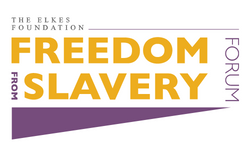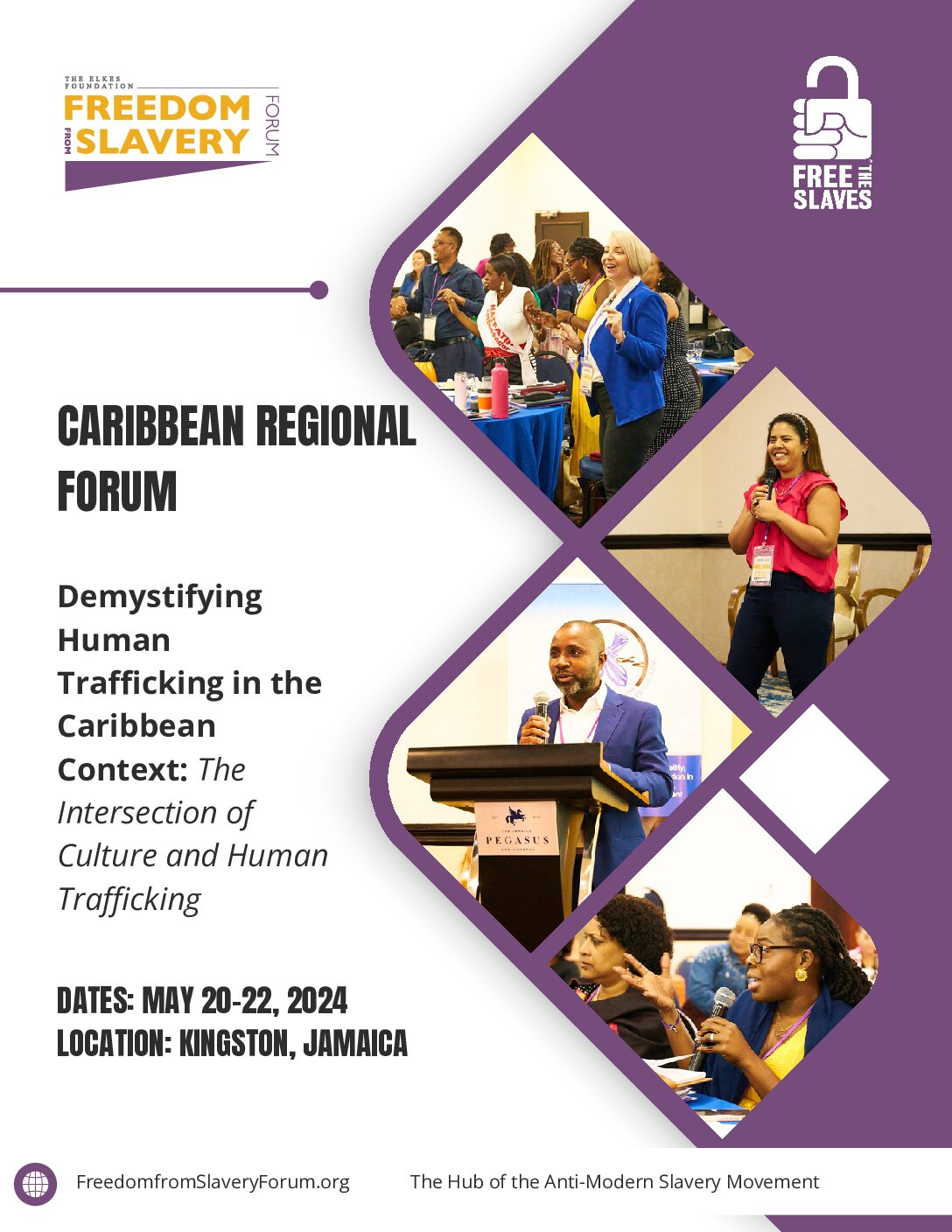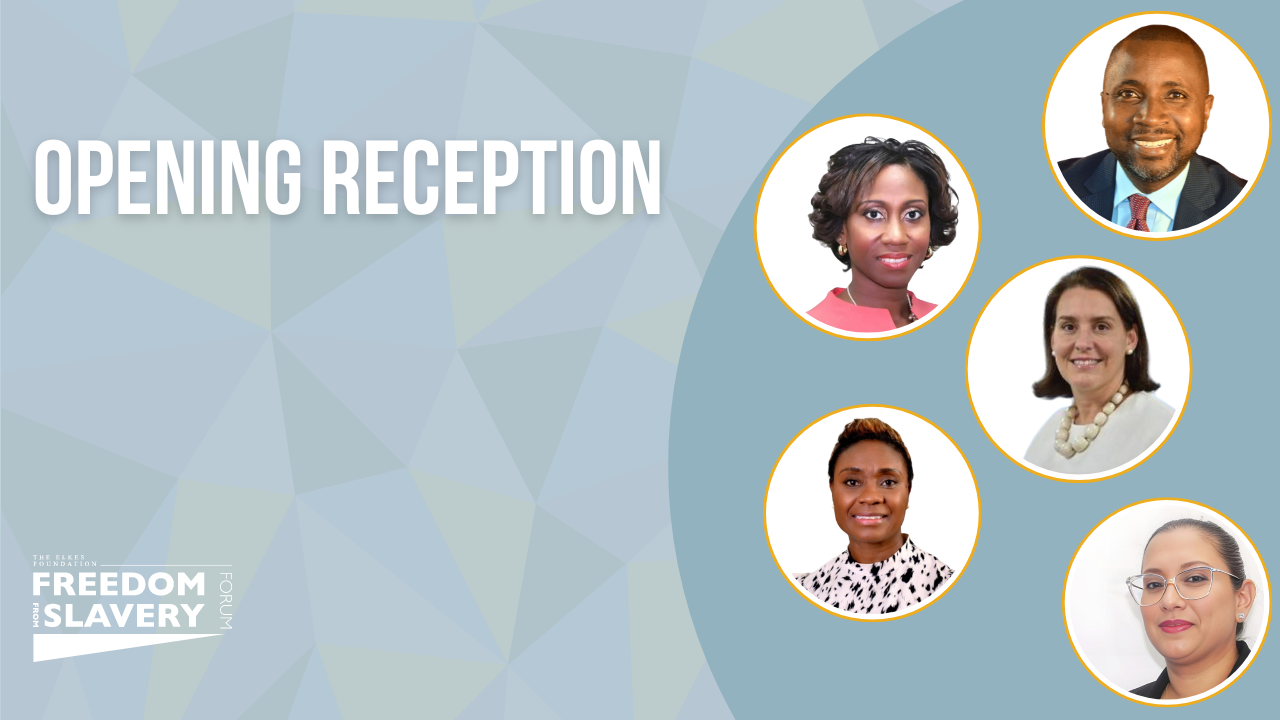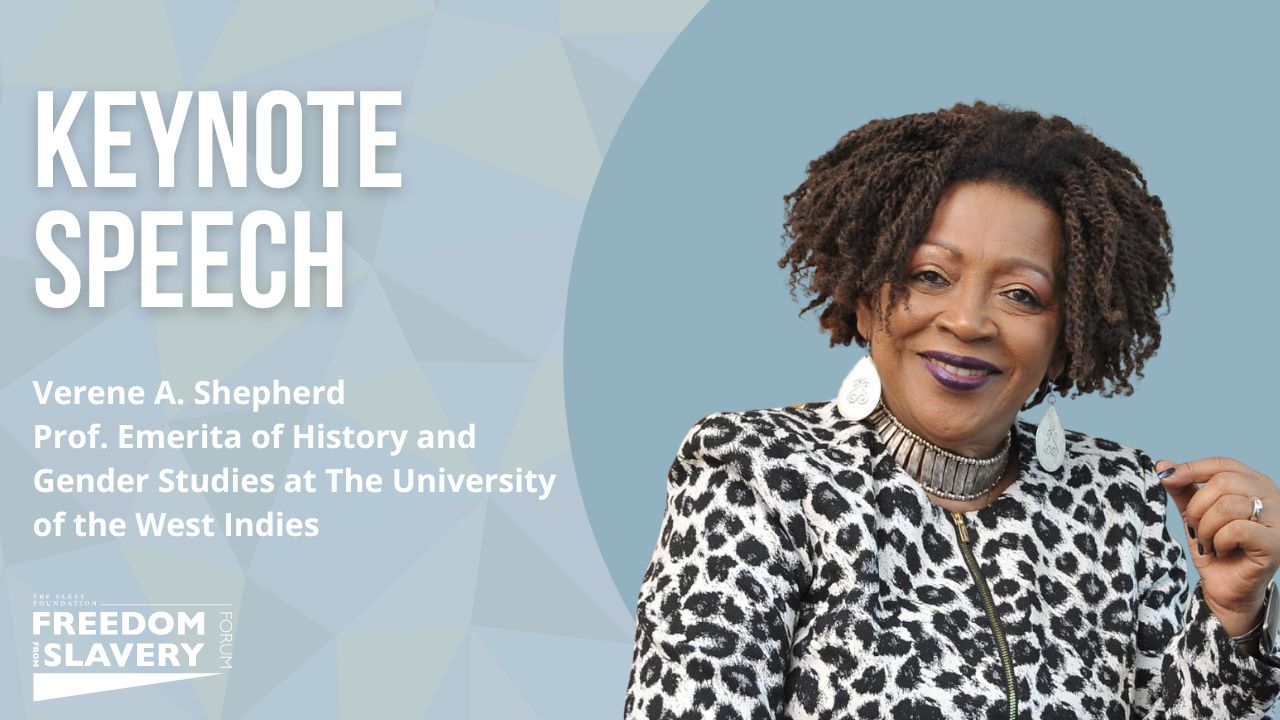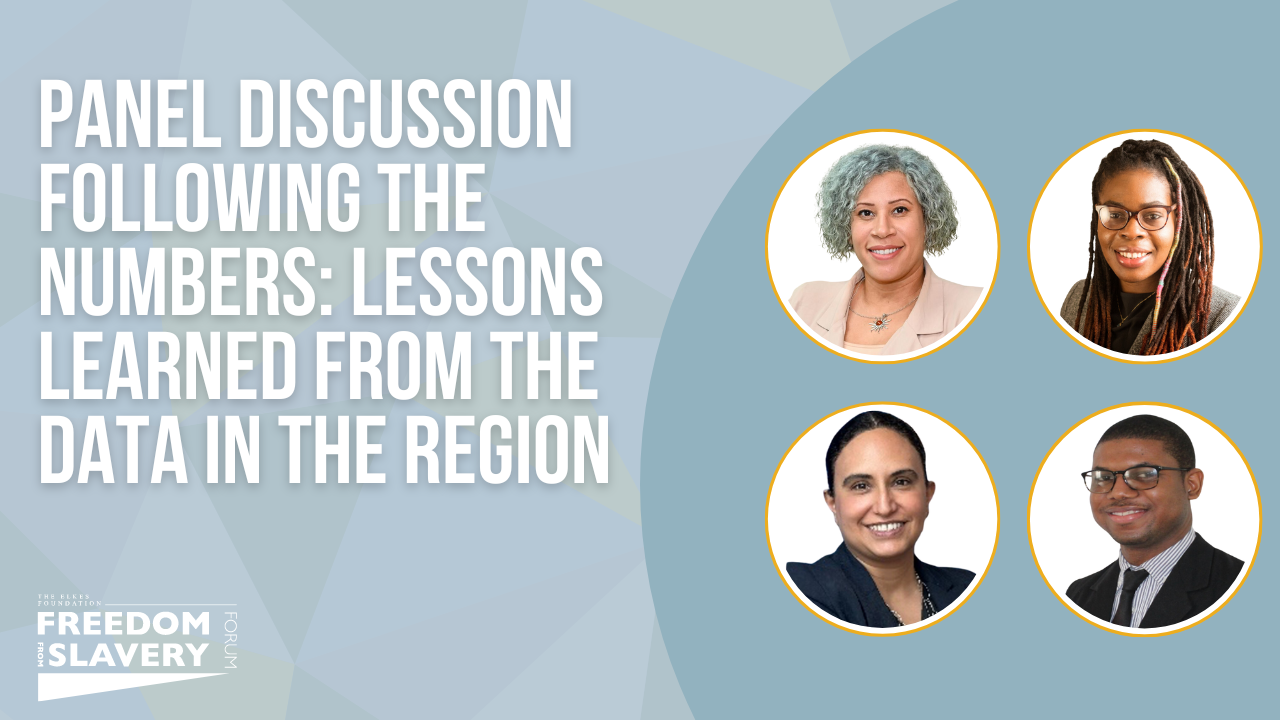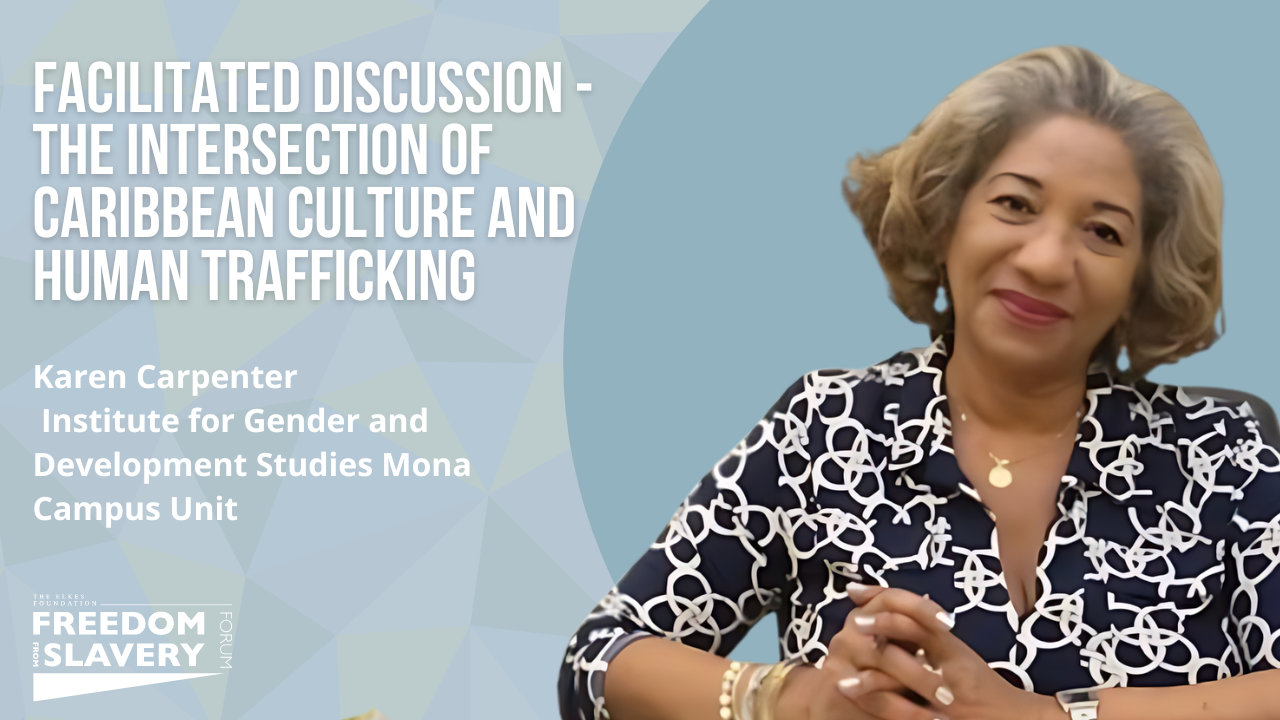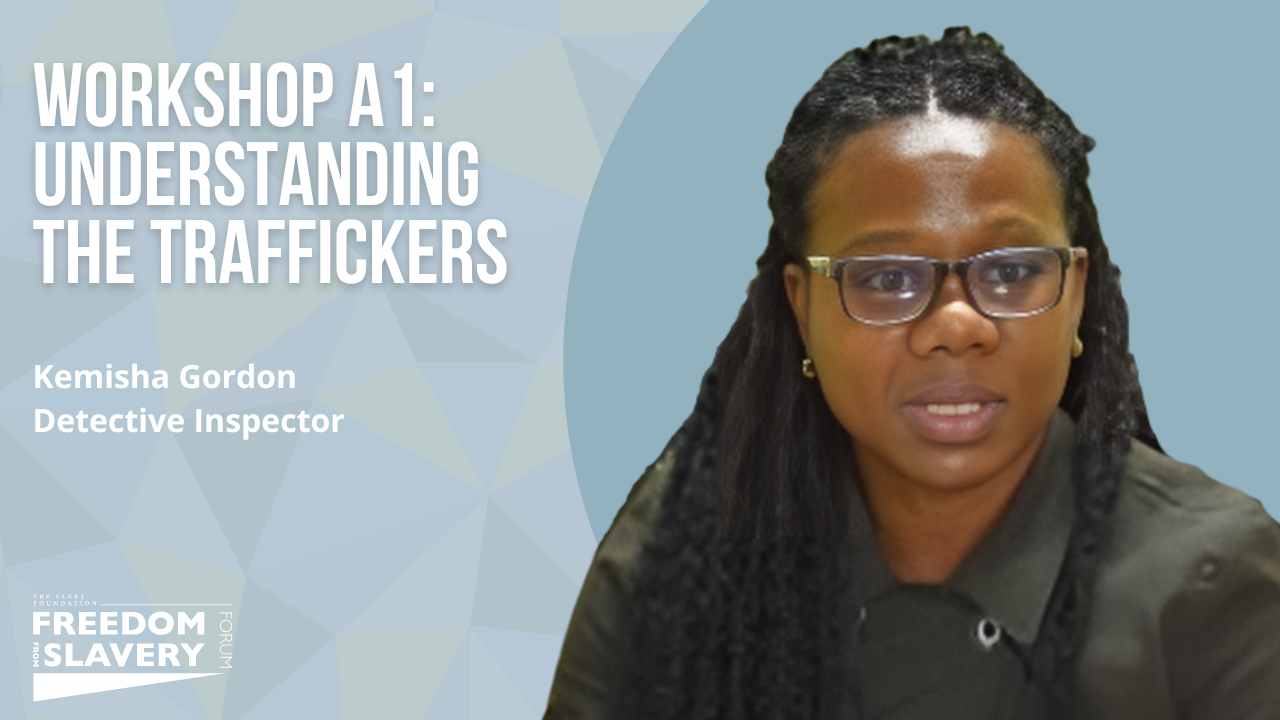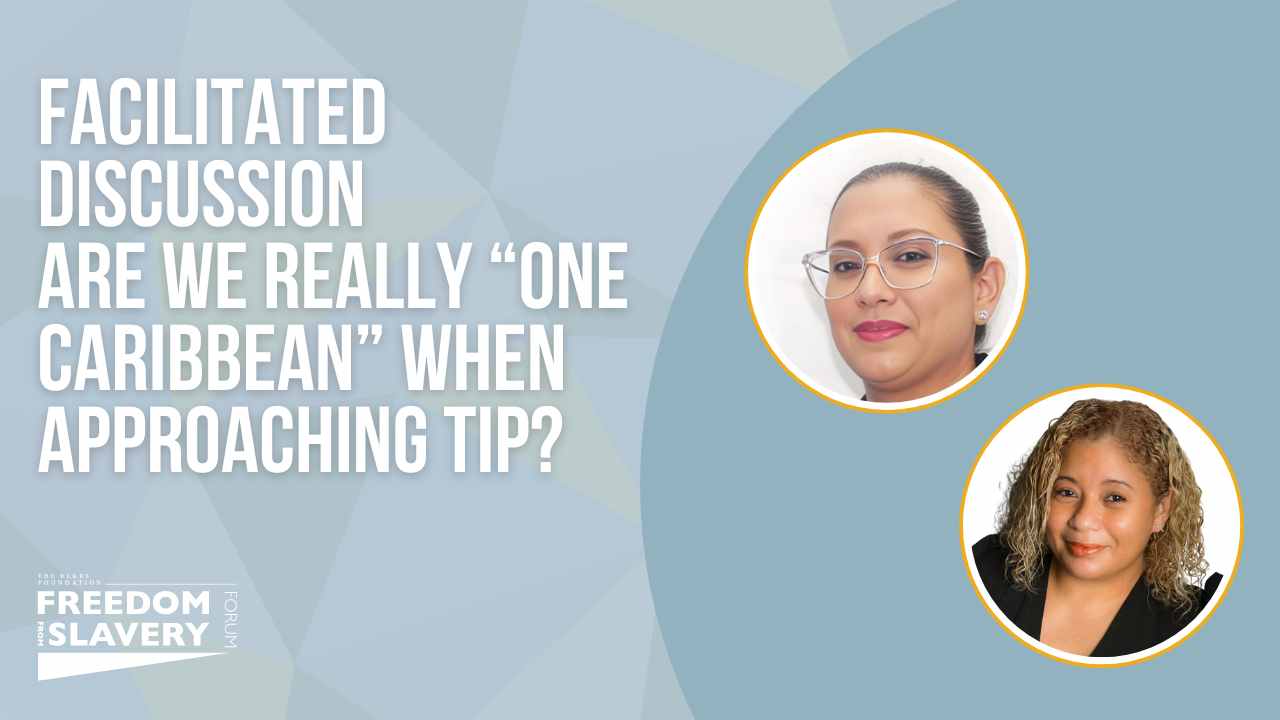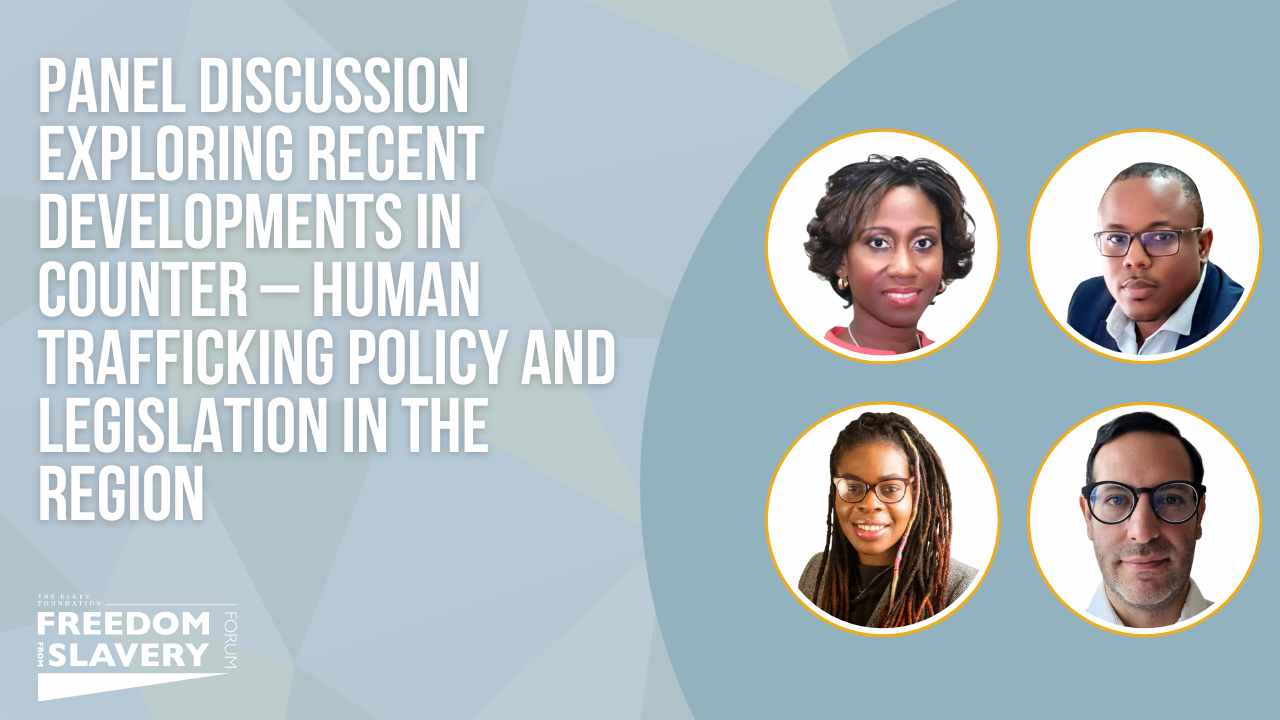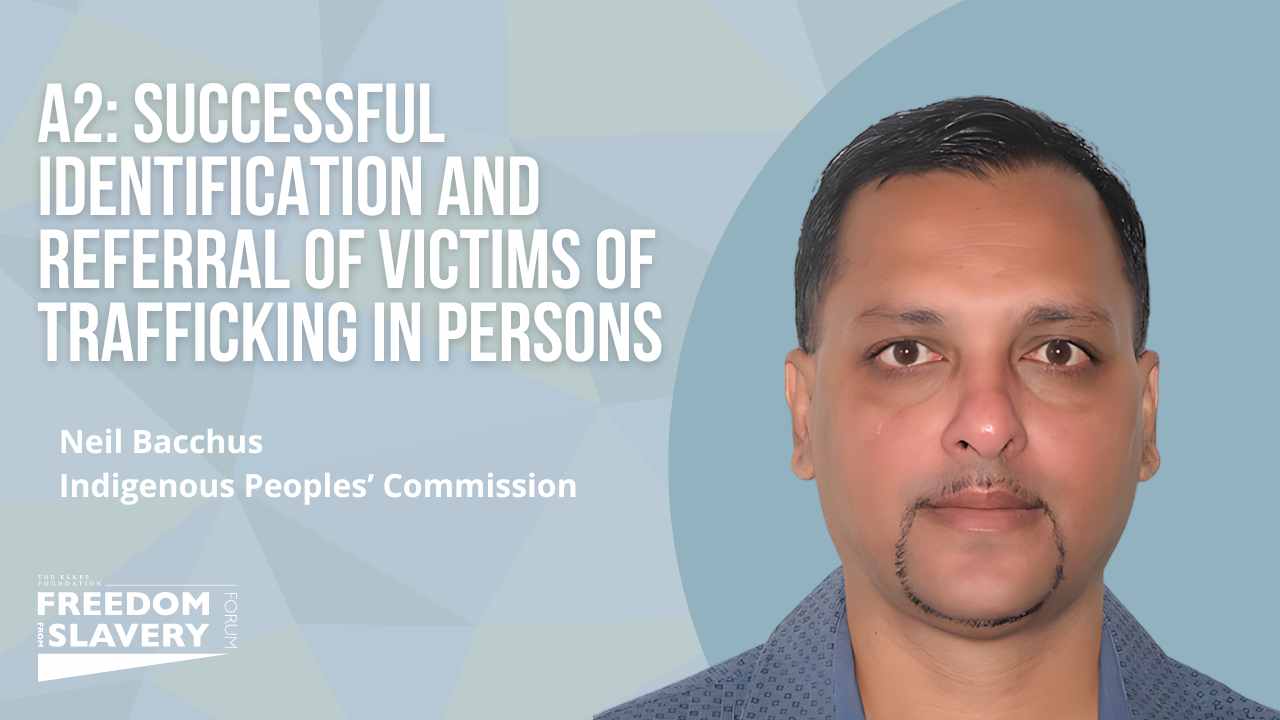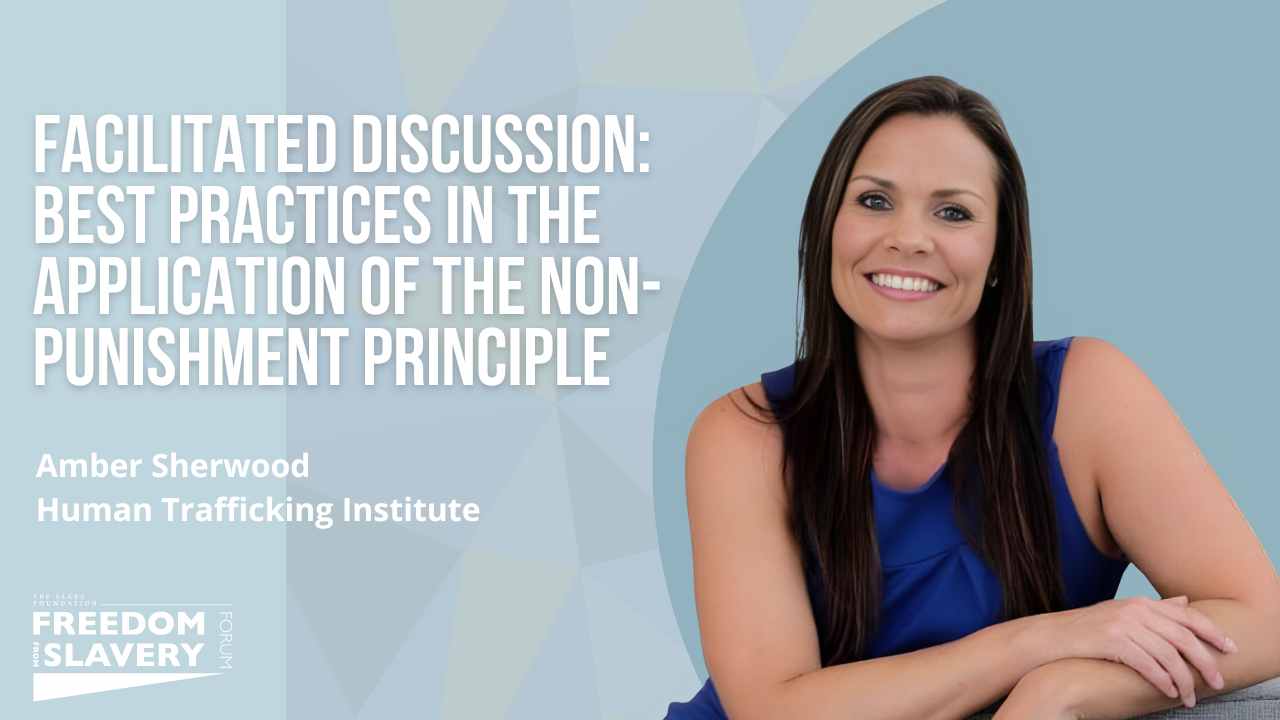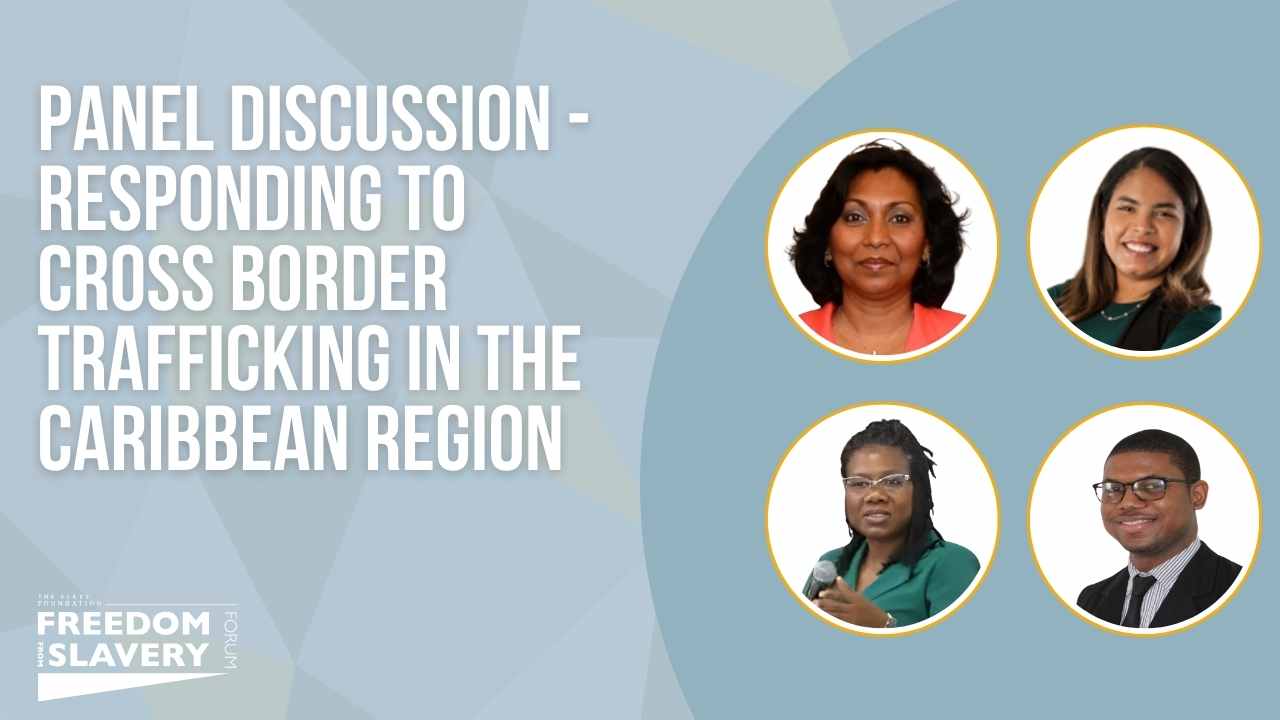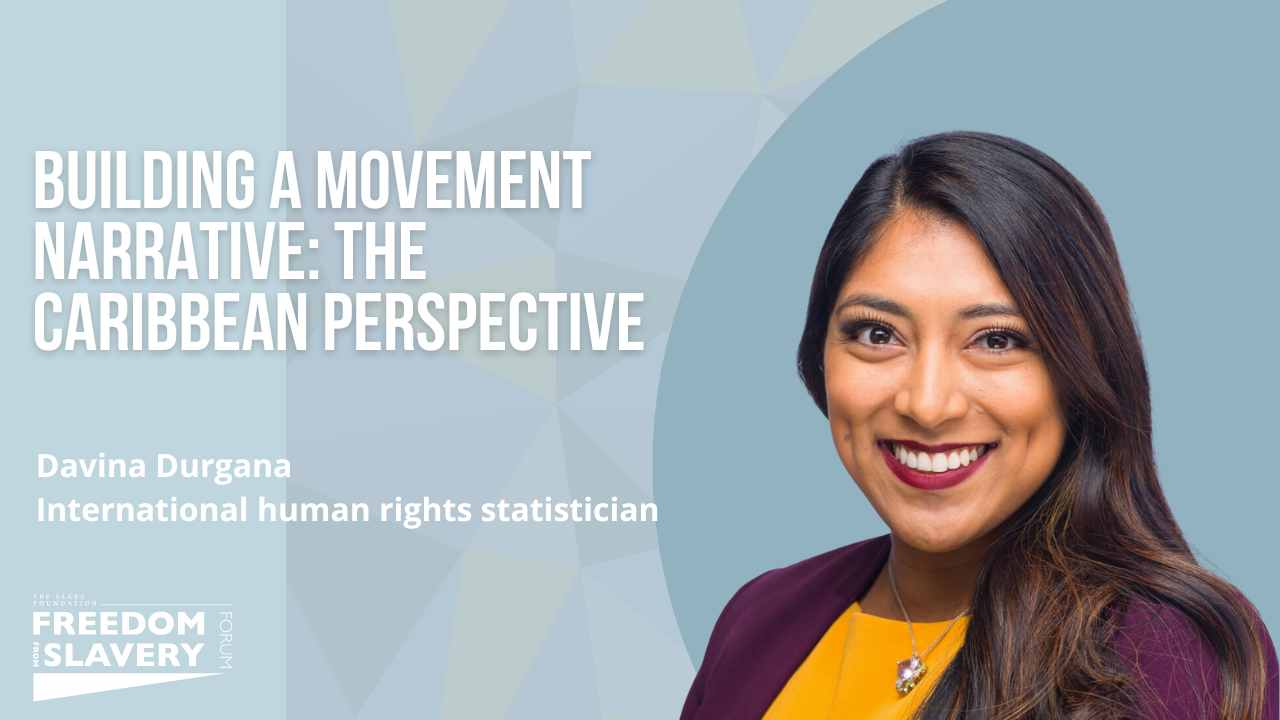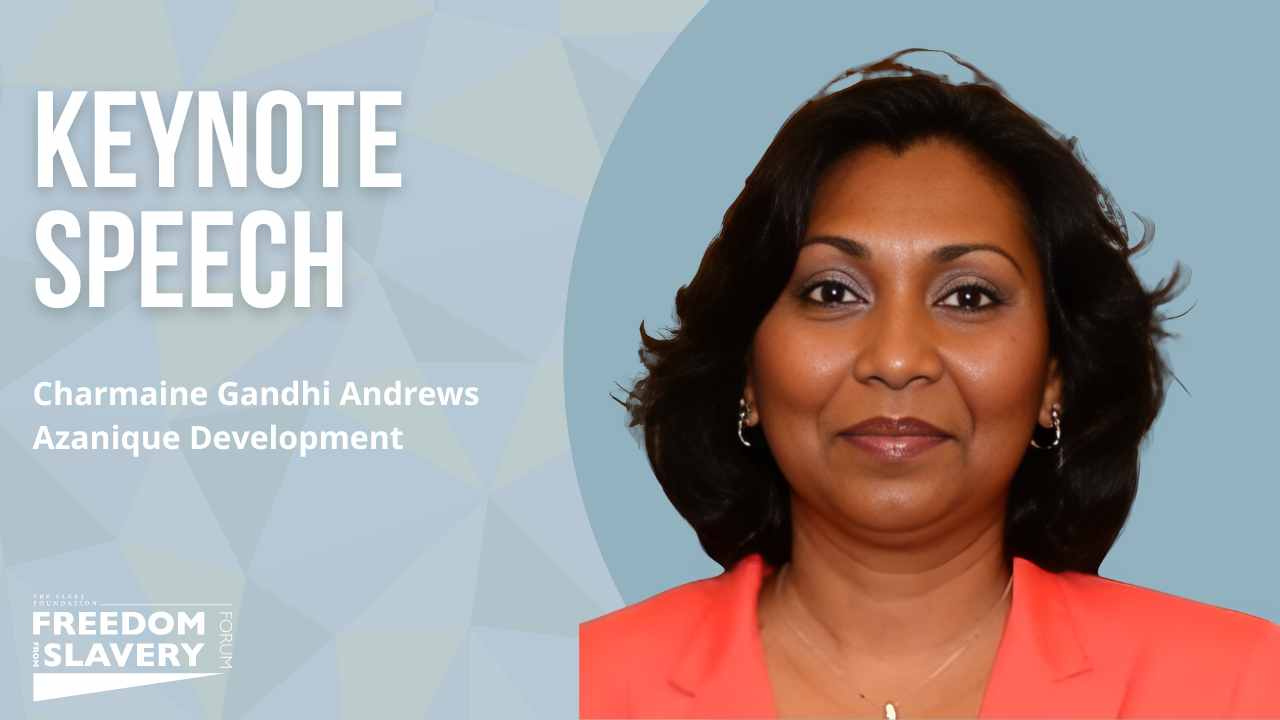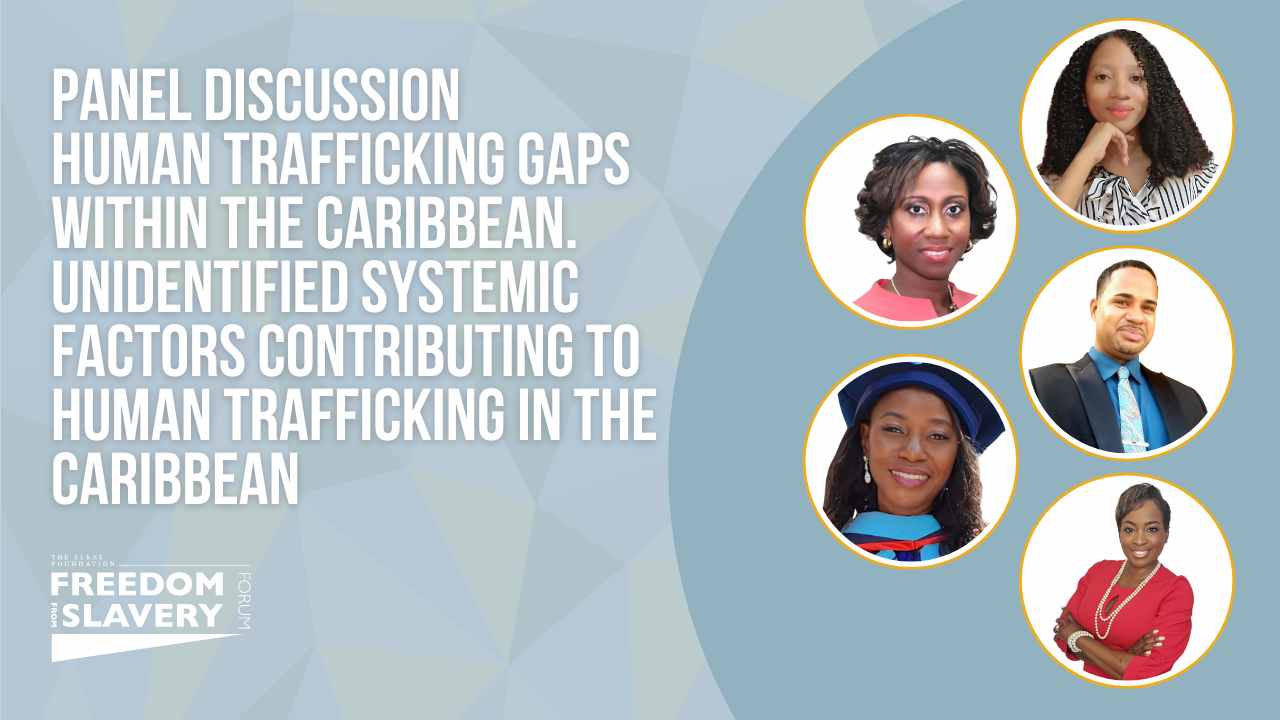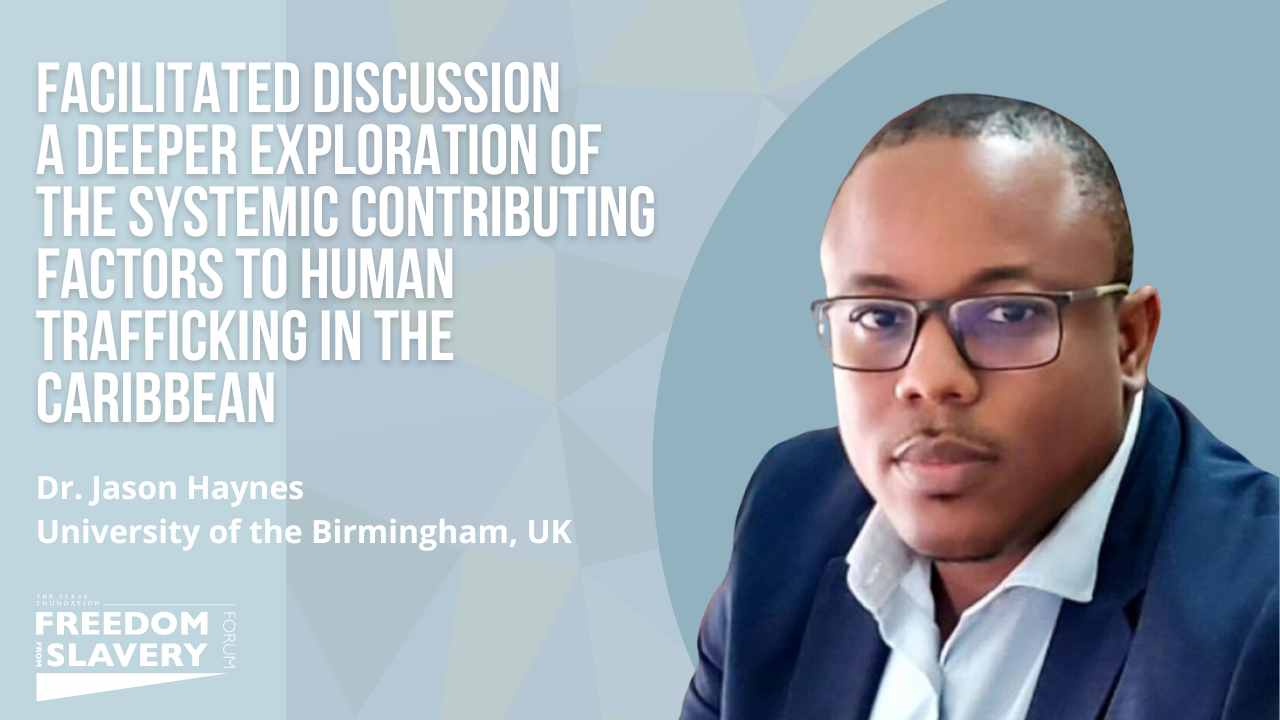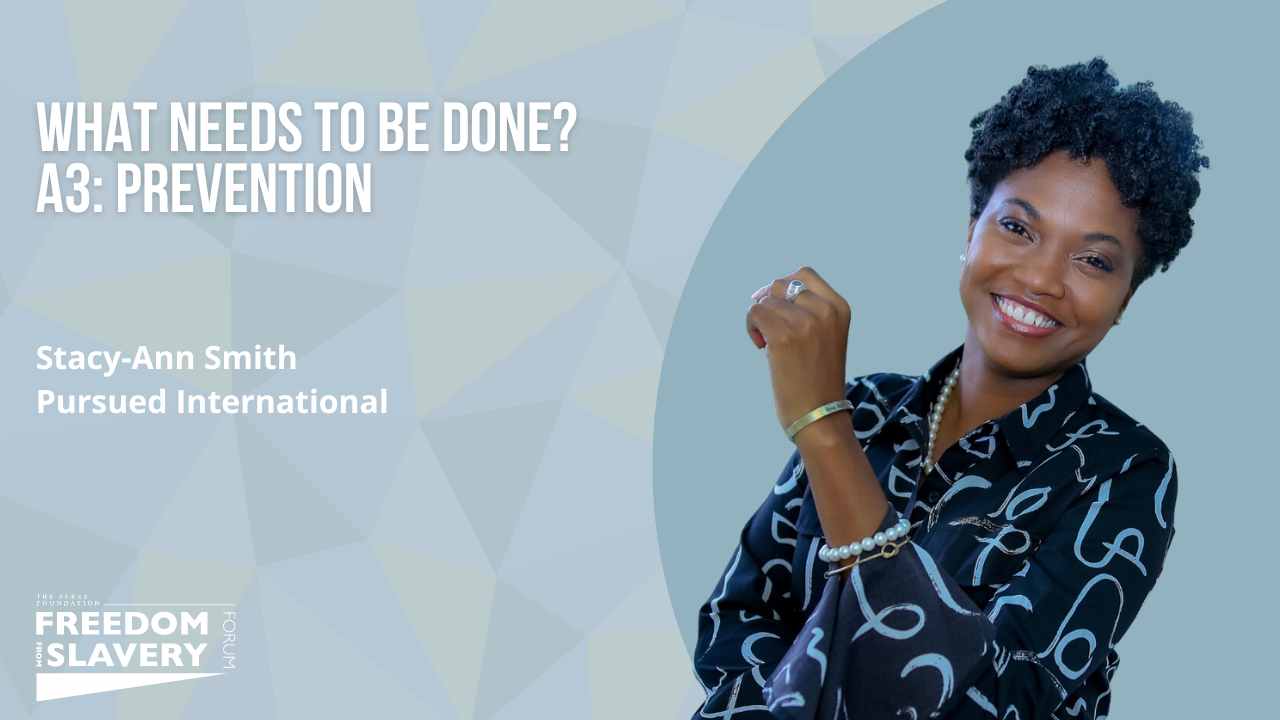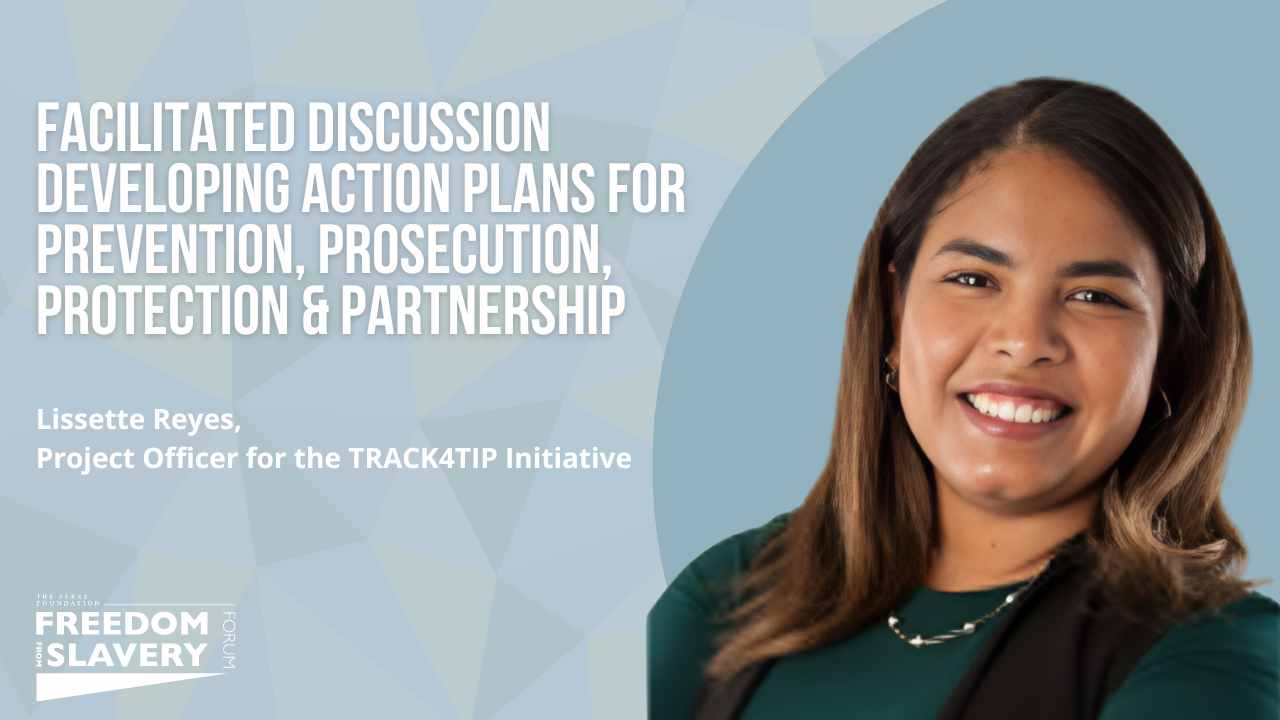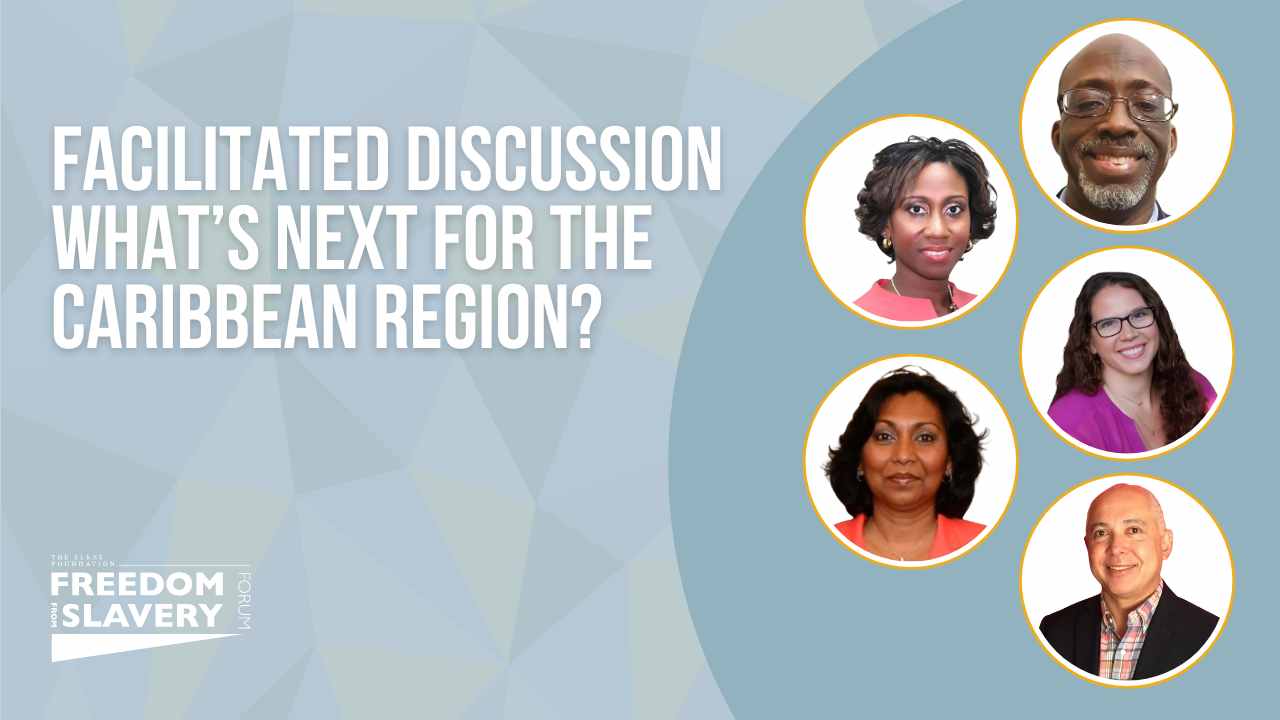2024 Freedom from Slavery Caribbean Regional Forum
In the idyllic landscapes of the Caribbean human trafficking is a hidden and pervasive threat. This modern form of slavery undermines the fabric of Caribbean societies, exploiting vulnerabilities and overshadowing the rich cultural heritage of the region. In the countries around the Caribbean, human trafficking hides behind questionable but often accepted cultural practices that are not recognized as trafficking or exploitation in local communities.
The 2024 Freedom from Slavery Caribbean Regional Forum is convened as a pivotal gathering designed to confront human trafficking head-on through an informed, culturally nuanced, and collaborative approach. This year’s forum explores the role of culture in perpetuating human trafficking and how regional cultural resources can be integrated into enhancing and accelerating the fight against the exploitation of women, men, and children.
It is a call to dismantle the trafficking networks that have entrenched themselves by exploiting historical, cultural, and socio-economic dynamics. Forum attendees will embark on a mission to demystify the complex and often hidden operations of human trafficking within the Caribbean through the lens of culture, which influences factors such as gender inequality, the demand for commercial sex, ethnic values, the mistrust by local communities of law enforcement, and hinders effective collaboration between state and non-state actors to address deep-rooted social challenges.
Theme
Demystifying Human Trafficking in the Caribbean Context:
The Intersection of Culture and Human Trafficking
May 20-22, 2024
Kingston, Jamaica
Pegasus Hotel
Outcomes
- Enhanced knowledge of the various ways in which human trafficking manifests in the Caribbean region and how culture has enabled exploitation to go unnoticed.
- Strengthened capacities of Caribbean anti-trafficking stakeholders to carry out more informed advocacy in their territories.
- Increased harmonization of efforts across the region through a call to action for greater regionalization.
- Increased number of Caribbean countries achieving Tier 1 status in the US State Department’s TIP report by filling the gaps in the region’s anti-trafficking response.
DAY 1 – May 20
Opening Reception
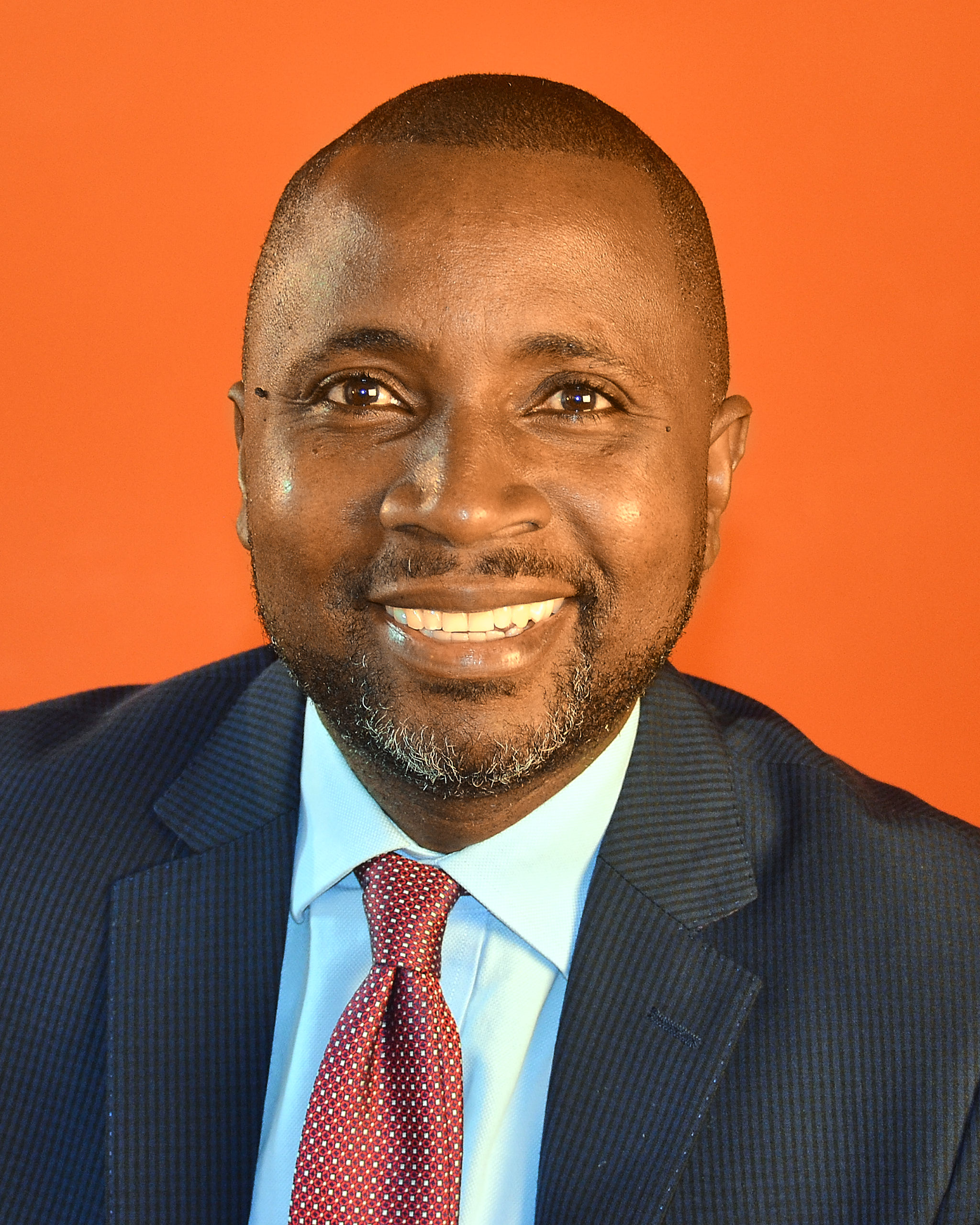
Bukeni Waruzi
Executive Director
Free The Slaves

Diahann Gordon Harrison
National Rapporteur on TIP
Jamaica

Sylvie Bertrand
Regional Representative
UNODC

Hon. Minister Juliet Cuthbert-Flynn
State Minister
Ministry of National Security

Amanda Ackbarali-Ramdial
Project Associate
CariSECURE 2.0
BIO
Bukeni Waruzi is the Executive Director of Free the Slaves. He has documented human rights abuses, implemented advocacy campaigns, conducted training workshops, and made public presentations in 40 countries in Africa, Asia, Europe, and the Americas. In the Democratic Republic of the Congo, his home country, he formed the grassroots nonprofit group AJEDI-KA/Child Soldiers Project to confront armed militias’ widespread enslavement of children. He videotaped evidence that led to the imprisonment of a notorious warlord. In Kenya, Waruzi served as a program manager for the Porticus Foundation, overseeing human rights, civic engagement, education, and climate change projects. He served as executive director of Watchlist in New York, an organization that protects children in conflict zones. And he has served as a senior program manager in New York for WITNESS, a group that empowers victims worldwide to collect evidence that brings perpetrators to justice. Waruzi has made presentations to the United Nations Security Council, the International Criminal Court, and the Children’s Caucus of the U.S. Congress.
BIO
Mrs. Diahann Gordon Harrison has been the Children’s Advocate of Jamaica since January 2012 and has been Jamaica’s National Rapporteur on Trafficking in Persons since March 2015, making her the first to hold such a post in the Latin American & Caribbean Region. She is an Attorney-at-Law by profession, with over 20 years of experience, and has practiced at the Public Bar since she graduated from The Norman Manley Law School. Before she was appointed Children’s Advocate, Mrs. Gordon Harrison served as a Deputy Director of Public Prosecutions within the Office of the Director of Public Prosecutions.
Known for her advocacy skills, she states that her current roles provide a national and regional platform from which to promote the rights of children and other people in vulnerable circumstances from a victim-centered and rights-based orientation. She is also passionate about accountability frameworks through which persons who violate the rights of children and vulnerable persons can be held responsible for their actions.
Mrs. Gordon Harrison is an Associate Tutor at the Norman Manley Law School, has also been an external reviewer for the British Council in Jamaica, and has been designated champion for CARICOM’s Regional Sex Guidelines for Courts. In November 2019, she was certified as a global expert by the Geneva-based Justice Rapid Response Roster of global experts in International Criminal Law for potential deployment worldwide with a focus on Crimes against Humanity, War Crimes, and International Human Rights Law. Since 2020 she has been a serving member of the Board of Directors for the International Society for the Prevention of Child Abuse and Neglect, a United States-based non-profit organization that works in over 200 countries worldwide.
Bio
Sylvie Bertrand, Regional Representative for the United Nations Office on Drugs and Crime
On July 1, 2022, Ms. Sylvie Bertrand (Canada, Bolivia) joined the United Nations Office on Drugs and Crime for Central America and the Caribbean (UNODC ROPAN) as its new Regional Representative. Bringing extensive experience to the region, Sylvie has been with UNODC since 2004, where she has served both in the field network in Kenya and South Africa and at its headquarters in Vienna. Most recently, she held the position of Deputy Regional Representative in the Regional Office for East Africa and, before joining the UNODC management team, she led various positions as advisor, expert, program coordinator and pillar head, implementing UNODC’s mandate in health and social development, including HIV/AIDS prevention, treatment, care and support for people who use drugs and those living and working in prison settings, as well as UNODC’s response to drug use prevention, treatment and care. Prior to joining UNODC, Sylvie worked at the United Nations Development Programme (UNDP) as a coordination officer in the Resident Coordinator’s Office in South Africa and, before joining the UN family, managed development projects in civil society organizations in Bolivia and Bulgaria.
She worked in the public sector at the municipal level addressing management practices, including results-based management and service delivery. Sylvie holds a Bachelor’s degree in Political Science, advanced degrees in Municipal Management and Law, as well as a Master’s degree in Public Administration from L’Ecole Administration.
Bio
The Hon. Juliet Cuthbert-Flynn, MP was appointed State Minister in the Ministry of National Security on May 22, 2023. Prior to this, she served as Minister of State in the Ministry of Health and Wellness.
The Hon. Juliet Cuthbert-Flynn is a committed and passionate leader who has been serving her country with distinction since she was 16 years old. She is a five-time Olympian, a multiple track and field medalist, a businesswoman and the Member of Parliament for West Rural St Andrew since 2016.
She hails from Port Morant, St Thomas and attended Morant Bay High School before emigrating at 16 years old. She proudly represented the University of Texas, Austin where she studied Sociology while leading the university to a NCAA Championship in 1986. She was inducted in the university’s Hall of Fame in 2015.
Since 2005, Minister Cuthbert-Flynn has operated a fitness and wellness centre and has been a lifelong advocate for a healthy lifestyle that includes good nutrition, exercise and a positive mindset. She is a certified personal trainer, media personality, motivational speaker, former physical trainer for the Arnett Gardens Football Club and served as Marketing Manager at Western Sports, where she was instrumental in having Puma International sign Usain Bolt in 2003. She is also a past board member of the Sports Development Foundation and the Institute of Sports, as well as a previous committee member for the Jamaica Anti-Doping Commission disciplinary panel. She was conferred with the Order of Distinction for her contribution to sports in 1992.
Mrs. Cuthbert-Flynn enjoys nature, interacting with and helping people and a good, hearty laugh. She is married to LeVaughn Flynn and has two children, Troy and Zara.
Bio
Amanda Ackbarali-Ramdial, a mental health practitioner since 2010, holds a Bachelor’s degree in Psychology and a Master’s degree in Mediation Studies from the University of the West Indies. Board Certified as a Civil and Family Mediator since 2013, she has a special interest in Victim Offender Mediation for Sexual Offenses.
Amanda has extensive training in Social Work, Domestic Violence Intervention, Family Mediation and Traumatic Incident Reduction among other areas and is a Master Trainer for Parents of Children with Disabilities. Her work at the Children’s Authority of Trinidad and Tobago marked a significant turn in her career towards child protection and combating human trafficking. Here, she played a pivotal role in establishing the Child and Family Services Unit in addition to developing interview protocols for child victims of trafficking, focusing on victim rights. She provided training to the Counter-Trafficking Unit in hotline and self-care skills, and served on a governmental committee responsible for securing safe housing for trafficked persons.
Amanda contributed significantly at the Rape Crisis Society of Trinidad and Tobago and the Coalition Against Domestic Violence as a counsellor, trainer and outreach officer where she engaged with walk-in survivors of trafficking in addition to large populations of survivors of sexual, child and domestic violence. Stemming from a ten-year teaching career, Amanda enjoyed years of facilitating hotline training for the Rape Crisis Society and the UNHCR in developing a bilingual hotline in Trinidad and Tobago. In addition, Amanda has offered empowerment at different ends of the continuum such as training police officers in working with survivors of domestic violence and conducting trauma-focused interventions to survivors at a shelter for battered women.
In 2018, she founded The Opening Lotus, with a strong drive to offer affordable and diverse mental health services and; leading projects focused on cultural-based psychosocial support and stress management. This included work with Prison Service of Trinidad and Tobago incorporating Restorative Justice practices such as Restorative Circles.
Amanda’s collaboration with the United Nations Development Programme since 2019 has involved her in Assessments, Training, and Rehabilitation of incarcerated and vulnerable youth, highlighting her commitment to vulnerable populations. She currently serves as the National Officer for the CariSECURE 2.0 project in Trinidad and Tobago, addressing Trafficking in Persons reduction. Amanda is dedicated to leveraging evidence-based approaches alongside innovation and care to effect positive change for society’s most vulnerable.
Cultural Perfomance
KEYNOTE SPEECH

Verene A. Shepherd
Prof. Emerita of History and Gender Studies at The University of the West Indies
Bio
St. Mary born Verene A. Shepherd, Prof. Emerita of History and Gender Studies at The University of the West Indies, is a graduate of St. Mary High School, Shortwood Teachers’ College, the University of the West Indies (The UWI) and the University of Cambridge, where she read for her PhD, In History. She is a Fellow of the Cambridge Commonwealth Society, Hon. Fellow, Jesus College, Cambridge.
She is the current Director of the Centre for Reparation Research at The UWI and a Vice Chair, and former Chair, of the United Nations’ Committee on the Elimination of Racial Discrimination, the oldest Treaty Body in the UN System that implements the International Convention on the elimination of all forms of racial discrimination. Prof Shepherd is the first Jamaican/CARICOM Citizen and the first Black Woman of African Descent in the African Diaspora to chair this Committee in its over 50 years. As a UN expert she has played a role in the drafting of the Programme of Activities for the UN International Decade for People of African Descent (2015-2024); and in the adoption of CERD General Recommendation 36 – “Preventing and Combatting Racial Profiling by Law Enforcement Officials.
Prof. Shepherd is a Vice-Chair of The CARICOM Reparations Commission and a former Chair and now member of the Jamaica National Council on Reparation. She is a published author/co-author, editor/co-editor of several books and refereed Journal articles. Among her books are The Biography of Lucille Mathurin Mair; Livestock, Sugar & Slavery: Contested Terrain in Colonial Jamaica; I Want to Disturb my Neighbour: Lectures on Slavery, Emancipation and Post-Colonial Jamaica and Maharani’s Misery: Narratives of a Passage from India to the Caribbean. Along with Prof Sir Hilary Beckles, she co-authored school texts like Liberties Lost, Freedoms Won, Caribbean Slavery in the Atlantic World and Caribbean Freedom.
She hosted Talking History on Nationwide 90 FM for 12 years, 2010-2022; is a past President of the Association of Caribbean Historians as well as a former University Director of The Institute for Gender & Development Studies, during which she spearheaded the production of The UWI’s Gender Policy; and a Board Member of the UWI-Glasgow Centre.
She has received several awards, including The Vice-Chancellor’s Award for Excellence for Public Service and the Order of Distinction, Commander Class from the Govt. of Jamaica for her work in History and Gender Studies and her public service.
She has lectured widely at Universities in Africa, Australia, New Zealand, the wider Caribbean, Canada, Europe, The UK, The USA and Latin America. She is married to Bramwell, has 2 sons and is the proud grand-mother of Nyla and Jules.
As a reparation advocate she embraces the mantra “An injustice without a remedy is abhorrent to the spirit of Justice” and as a Historian she agrees with with Rt Excellent Marcus Garvey that “History is the landmark by which we are directed into the true course of life”.
PANEL DISCUSSION
Following the Numbers: Lessons Learned from the Data in the Region
This session will explore the questions: Do we have enough data? How do we treat the anecdotal data on the ground? Where does this data come from and who is providing this data? (including here various countries that are not often recognized in the data or in funding); Who are the victims? Who are the traffickers? How can we use the available data for each country to understand human trafficking?

PVC Sandrea Maynard
Moderator
Pro-Vice Chancellor, Global Affairs The University of the West Indies, Regional Headquarters
Bio
Ms. Sandrea Maynard has been a qualified Barrister-at-Law since 1998 and has practiced both privately (domestic and internationally) and for the United Kingdom’s Crown Prosecution Service. Her journey working in academia began in 2012 as a Senior Lecturer and advanced to an Associate Professor in Law. She has held senior leadership and management roles within UK universities across the sectors of law, business and university group subsidiaries both nationally and regionally, and managed multi-disciplinary and multifunctional teams through globally disruptive changes such as BREXIT and COVID-19. She has been responsible for driving the development of and sustainability of internationalisation in higher education, and managing global partnerships. More recently, her particular focus has been on income generation nationally and globally within Higher Education. She was instrumental in the development of a national curriculum in the criminal justice sector in the UK, and led on, and secured significant government contracts. She has also spearheaded the development and delivery of global executive and governmental training and international student recruitment. PVC Maynard also serves as a Visiting Professor in France and is a Senior Fellow of the Higher Education Academy UK.
As Pro-Vice-Chancellor for Global Affairs at The University of the West Indies (The UWI) she leads the regional university’s global engagement portfolio and coordinates all internationalisation and strategic global initiatives across The UWI system. She is also responsible for the progression of the new International School for Developmental Justice as part of the new UWI Global Campus, leveraging the high reputation of the regional university to build capacity and generate revenue as a core part of the University’s financial future. As part of her portfolio is the University Office of Global Partnerships and Sustainable Futures (OGPSF). The OGPSF has played a pivotal role in deepening The UWI’s collaborations with multilateral development partners, international foundations, and university consortia. In addition to spearheading the mobilisation of significant funding for The UWI, Ms. Maynard has successfully led several flagship initiatives that have helped to bolster The UWI’s global positioning. Ms. Maynard’s office has coordinated with The UWI’s regional Sustainability Futures initiatives, examples include Global Institute for Climate-Smart and Resilient Development, Centre of Excellence for Oceanography and Blue Economy, Climate Justice Advocacy, International Universities Climate Alliance, Race to Zero Commitment for Universities and Colleges, Future Earth Project and Responsible Futures. Ms Maynard secured and leads the partnership with UNESCO IESALC and UNOSSC with the pilot project, Youth-Led Greening Technology Transfer within the South-South University Cooperation Network (SUCN).

Cherisse Francis, PhD
Panelist
Attorney at law. Doctoral Candidate researching Trafficking in persons
Bio
Ms. Cherisse Francis is a native of the beautiful Caribbean island of Barbados. Although she now considers herself to be an educator and researcher Cherisse began her career as a legal professional having graduated from the University of the West Indies, Cave Hill Campus with a Bachelor of Laws (First Class Honours) and the University of Aberdeen with a Master of Laws (Distinction). Cherisse also attended the Hugh Wooding Law School where she completed her Legal Education Certificate on the Principal’s Honour Roll and was subsequently called to the Barbadian legal bar in 2018. Throughout her educational pursuits, Cherisse remained committed to the pursuit of human rights through academia and her volunteering activities. After her LLM, Cherisse spent a short time as an intern at the United Nations Office for Barbados and the OECS before accepting a position with the Human Trafficking Institute (HTI). From 2019 to 2020 Cherisse was employed by the HTI as Judicial Research Assistant to the designated Trafficking in Persons Judge in the Belizean High Court. In this role she was involved in legal writing and research as well as training activities for state and non-state actors both in Belize and across the Caribbean. These experiences led Cherisse to pursue her PhD studies examining the culture, history, discourses and law surrounding anti-trafficking in the Anglophone Caribbean at the University of Warwick, UK which she submitted in January 2024. Since becoming a part of the regional anti-trafficking field Cherisse has also been involved in numerous consultancies, trainings, and workshops as a facilitator and scholar. At present, Cherisse is a Senior Lecturer (Law) at St. Mary’s University, Twickenham in England where she has taught among other things a course on Organised Crime, Trafficking and Contemporary slavery. She also continues to be engaged in research and serves as a trustee for the Commonwealth Human Rights Initiative (London Office) which has modern slavery as a flagship area.

Adriana Oropeza
Panelist
Bio
Adriana Oropeza is a Mexican economist with over 28 years of experience shaping public policies grounded in the use of statistical and geographical information, and subsequent implementation through partnerships with key institutions and sectors.
In October 2023, she joined as the Coordinator of the UNODC – INEGI Center of Excellence, tasked with enhancing institutional capacities in Latin America and the Caribbean to bolster the generation of statistical information on government, crime, victimization, and justice.
For the past 15 years, she has served as an advisor to the Governing Board of the National Institute of Statistics and Geography in Mexico, where she developed new methodologies and statistical frameworks at national, regional, and international levels. Her involvement in expert groups has included representation in the Interagency and Expert Group on Gender Statistics of the United Nations Statistics Division, as well as in migration, environment, and climate change statistics groups, among others.
Adriana brings a wealth of experience as a generalist, having navigated diverse sectors and disciplines, thereby enriching her perspective and approach to policy development and implementation.
Previously, Ms. Oropeza held the position of Director of the Private Sector Studies Center and served as an advisor to the Ministries of Agriculture and Environment.

Oliver Profitt
Panelist
National Project Officer, IOM
Bio
Oliver Profitt has been a National Project Officer with the International Organization for Migration (IOM) Guyana Office for the past four+ years and has more than eleven years of experience in counter-trafficking in persons. Oliver is also part of IOM’s Caribbean Coordination Team and currently serves as one of IOM’s Caribbean Focal Points on multiple protection and other migration-related issues, including trafficking in persons. From 2019-2021, Oliver managed a US-funded counter-trafficking in persons project in support of the work of the Government of Guyana on this issue, which led to the development of Standard Operating Procedures on the Prosecution of Trafficking in Persons in Guyana, among other key products. Before working with IOM, Oliver worked as Coordinator (ag) of the Ministerial Task Force on Trafficking in Persons, and earlier as a Research Officer, both with the Ministry of Home Affairs in Guyana, during which time he was able to lead or support numerous initiatives related to counter-trafficking and other crime and security-related issues locally, including the production of National Annual Reports and Action Plans on Trafficking in Persons. He also holds a bachelor’s degree in economics from the University of Guyana and is an alumnus of the International Law Enforcement Academy (ILEA) in Roswell, New Mexico, USA.
Facilitated Discussion
The Intersection of Caribbean Culture and Human Trafficking
This facilitated discussion will explore the various ways in which the culture in Caribbean nations facilitates various forms of trafficking in the region (migration, trafficking through sports, familial trafficking, views on prostitution/commercial sex, child begging).

Karen Carpenter PhD
Facilitator
Head/Senior Lecturer
Institute for Gender and Development Studies Mona Campus Unit
Bio
DR. KAREN CARPENTER is the Head of The Institute for Gender & Development Studies, and Senior Lecturer at the University of the West Indies, Mona Campus. She is a Licensed Counselling Psychologist in Jamaica and a Florida Board Certified Clinical Sexologist. Dr Carpenter also runs The Caribbean Sexuality Research Group (CSRG) free, public Clinic, at the University Hospital of The West Indies. Her books include: Love & Sex: The Basics, Questioning Caribbean Jewish Identity, Interweaving Tapestries of Sexuality & Culture and Language, Race & the Global Jamaican. Dr Carpenter is the host of “Love & Sex” on Facebook Watch.
Workshop A1: Understanding the Traffickers
This workshop will take a deeper look at who are the traffickers in the region and what vulnerabilities they are exploiting. We will explore what traffickers and trafficking organizations look like (e.g., Sporting, unemployment, schools and children and sponsor-walk sheets).
Detective Inspector Kemisha Gordon
Facilitator
Bio
Detective Inspector Kemisha Gordon, sub-officer with responsibility for the strategic coordination and management of the anti-Trafficking in Persons (Vice) Unit.I’ve been serving the JCF since 2001, a total of twenty three years . I’ve served the Mobile Reserve Division, National Firearm and Drug Intelligence Centre, now the National Intelligence Bureau and the Organized Crime Investigations Division now the Counter Terrorism and Organized Crime Investigations Branch. I’ve been assigned to the Trafficking Persons unit for over 17 years, where i have been engaged in Trafficking related investigations as well as public awareness activities, along with other aspects of the unit’s mandate.
Workshop B 1: Cultural and Historical Connections Within and Between the Caribbean Countries.
This workshop will take a look at the cultural and historical commonalities that are perpetuating trafficking in the region such as domestic servitude – linking this to historical legacies such as the house-girl from West Africa and Indo-Caribbean traditions. This workshop will be interactive and include checking biases that make it difficult for people to recognize trafficking when it’s happening; high rates of migration, etc.

Dr. Elizabeth Thomas Hope
Facilitator
Chair of Environmental Management at the University of the West Indies
Bio
Professor Elizabeth Thomas-Hope holds a doctorate from Oxford University and Master degrees from the Universities of Aberdeen and Pennsylvania State. She was appointed to the Chair of Environmental Management at the University of the West Indies in 1993. She is a Fellow of the Royal Geographical Society (FRGS) and a recipient of the Government of Jamaica award of Order of Distinction, Commander Class (CD). She has done extensive research into various aspects of migration and has undertaken consultancies internationally and nationally. She is currently Professor Emerita at the University of the West Indies, attached to the Sir Arthur Lewis Institute for Social & Economic Studies (SALISES) Mona.
Facilitated Discussion
Are We Really “One Caribbean” When Approaching TIP?
Do Caribbean countries work together to combat trafficking or are we working in silos?

Amanda Ackbarali-Ramdial
Facilitator
Project Associate, CariSECURE
Bio
Amanda Ackbarali-Ramdial, a mental health practitioner since 2010, holds a Bachelor’s degree in Psychology and a Master’s degree in Mediation Studies from the University of the West Indies. Board Certified as a Civil and Family Mediator since 2013, she has a special interest in Victim Offender Mediation for Sexual Offenses.
Amanda has extensive training in Social Work, Domestic Violence Intervention, Family Mediation and Traumatic Incident Reduction among other areas and is a Master Trainer for Parents of Children with Disabilities. Her work at the Children’s Authority of Trinidad and Tobago marked a significant turn in her career towards child protection and combating human trafficking. Here, she played a pivotal role in establishing the Child and Family Services Unit in addition to developing interview protocols for child victims of trafficking, focusing on victim rights. She provided training to the Counter-Trafficking Unit in hotline and self-care skills, and served on a governmental committee responsible for securing safe housing for trafficked persons.
Amanda contributed significantly at the Rape Crisis Society of Trinidad and Tobago and the Coalition Against Domestic Violence as a counsellor, trainer and outreach officer where she engaged with walk-in survivors of trafficking in addition to large populations of survivors of sexual, child and domestic violence. Stemming from a ten-year teaching career, Amanda enjoyed years of facilitating hotline training for the Rape Crisis Society and the UNHCR in developing a bilingual hotline in Trinidad and Tobago. In addition, Amanda has offered empowerment at different ends of the continuum such as training police officers in working with survivors of domestic violence and conducting trauma-focused interventions to survivors at a shelter for battered women.
In 2018, she founded The Opening Lotus, with a strong drive to offer affordable and diverse mental health services and; leading projects focused on cultural-based psychosocial support and stress management. This included work with Prison Service of Trinidad and Tobago incorporating Restorative Justice practices such as Restorative Circles.
Amanda’s collaboration with the United Nations Development Programme since 2019 has involved her in Assessments, Training, and Rehabilitation of incarcerated and vulnerable youth, highlighting her commitment to vulnerable populations. She currently serves as the National Officer for the CariSECURE 2.0 project in Trinidad and Tobago, addressing Trafficking in Persons reduction. Amanda is dedicated to leveraging evidence-based approaches alongside innovation and care to effect positive change for society’s most vulnerable.

ANDREINA BRICEÑO VENTURA-BROWN
Facilitator
FOUNDER, La Casita HCC
Bio
Andreina Briceño Ventura – Brown, hailing from Maracaibo, Zulia State, Venezuela, is a dedicated advocate for community development and cultural integration. Holding a degree in Social Communication with a focus on Community Development from the Catholic University Cecilio Acosta of Maracaibo, she has honed her skills and knowledge in various fields, including arts, culture, and the common good. Throughout her career, Andreina has exhibited exceptional communication abilities, problem-solving skills, and analytical prowess.
She has served as a journalist for prominent media outlets such as the Regional Broadcasting Corporation, La Columna, and El Tiempo newspapers, as well as Televiza del Zulia television station. Her contributions extend to radio production, including programs such as A Primera Hora and the Cultural Agenda of Circuito CRB. Additionally, she has freelanced as an interpreter with BBC in London. Andreina’s commitment to social justice led her to undergo training under the Ministry of National Security and the International Organization for Migration, where she became involved in research regarding Trafficking in Persons.
She has since dedicated herself to the identification, protection, and response for victims of trafficking. Recognizing the need for positive representation of Latin women in Trinidad and Tobago, Andreina founded and served as the editor-in- chief of T&TARAS GUIDE, the first bilingual magazine on the island. Through this initiative, she aimed to highlight the mutual influence of Hispanic countries and Trinidad and Tobago. Her passion for education and cultural exchange prompted Andreina to establish bilingual camps for children, emphasizing language learning through arts, culture, and sports. She played a pivotal role in introducing bilingual education at Febeau Village Government School in San Juan and founded La Casita Hispanic Cultural Centre, a hub for cultural integration and community coexistence.
As the founder of La Casita, Andreina has tirelessly advocated for the rights of her fellow Venezuelans in Trinidad and Tobago, providing support and resources to those in need. Trained in International Refugee Law and Migration Law, she actively represents asylum seekers, refugees, and migrants before international and governmental institutions. Currently, through her RESET project, Andreina leads a holistic team dedicated to supporting female victims of gender-based violence, empowering them to enhance their quality of life and that of their families. La Casita collaborates with various organizations, including the United Nations High Commissioner for Refugees, UNICEF, Red Cross, and the International Organization for Migration, to ensure the protection and integration of the Hispanic community in Trinidad and Tobago. Andreina’s unwavering commitment to social justice and community development continues to make a profound impact on society.
DAY 2 – May 21
Keynote Speaker
Ambassador Alison Stone Roofe
Permanent Secretary, Ministry of National Security & Chairman of the National Task Force Against Trafficking in Persons (NATFATIP)
Keynote Speaker Bio
With more than thirty (30) years experience in the public sector, Ambassador Alison Stone Roofe joined the Ministry of National Security as Permanent Secretary on May 1, 2023. She has a wealth of expertise in managing teams and multi-stakeholder relationships, building strategic partnerships, and cultivating global alliances.
Ambassador Stone Roofe has held several key positions at the Ministry of Foreign Affairs and Foreign Trade, where she played a vital role in establishing relationships with partners both domestically and abroad. She has served as Ambassador and Head of Mission to the Embassy of Jamaica in Brazil, Director of the Caribbean and Americas Department, Under-Secretary for Bilateral, Regional and Hemispheric Affairs, Under Secretary for Multilateral Affairs and Acting Chief Technical Director of the Foreign Ministry. Her appointment in 2021, as Permanent Representative of Jamaica to the International Seabed Authority is also a testament to her capabilities and the confidence placed in her leadership.
Ambassador Stone Roofe received a Commonwealth Scholarship to the University of Oxford (1993 – 1997) where she gained an M.Phil. in International Relations. She has also obtained a Master of Science Degree in Social Sciences (with Distinction), and a Bachelor of Science degree in International Relations (First Class Honours) from the University of the West Indies, Mona, Jamaica. In 1988 she received the Sir Laurence Lindo Prize for the best student in International Relations.
She has been recognized for her outstanding contributions in the field of international relations, public administration and diplomacy. In 2008 she was selected for the US International Visitor Leadership Programme and awarded the Order of the Rio Branco by the Brazilian Government in 2019.
The Permanent Secretary previously served on the Boards of the Jamaica National Agency for Accreditation, the Maritime Authority of Jamaica and the CARICOM Inter-Governmental Task Force on the review of the Revised Treaty of Chaguaramas.
Her education, training and vast experience both locally and overseas have equipped her with an understanding of the complex issues facing Jamaica’s national security.
Panel Discussion
Exploring Recent Developments in Counter – Human Trafficking Policy and Legislation in the Region
Panelists will provide a critical analysis of the recent developments in counter-trafficking legislation and policy across the region. What are some areas of success? What are some areas for improvement?

Diahann Gordon Harrison
Moderator
National Rapporteur on Trafficking in Persons
Jamaica
Bio
Mrs. Diahann Gordon Harrison has been the Children’s Advocate of Jamaica since January 2012 and has been Jamaica’s National Rapporteur on Trafficking in Persons since March 2015, making her the first to hold such a post in the Latin American & Caribbean Region. She is an Attorney-at-Law by profession, with over 20 years of experience, and has practiced at the Public Bar since she graduated from The Norman Manley Law School. Before she was appointed Children’s Advocate, Mrs. Gordon Harrison served as a Deputy Director of Public Prosecutions within the Office of the Director of Public Prosecutions.
Known for her advocacy skills, she states that her current roles provide a national and regional platform from which to promote the rights of children and other people in vulnerable circumstances from a victim-centered and rights-based orientation. She is also passionate about accountability frameworks through which persons who violate the rights of children and vulnerable persons can be held responsible for their actions.
Mrs. Gordon Harrison is an Associate Tutor at the Norman Manley Law School, has also been an external reviewer for the British Council in Jamaica, and has been designated champion for CARICOM’s Regional Sex Guidelines for Courts. In November 2019, she was certified as a global expert by the Geneva-based Justice Rapid Response Roster of global experts in International Criminal Law for potential deployment worldwide with a focus on Crimes against Humanity, War Crimes, and International Human Rights Law. Since 2020 she has been a serving member of the Board of Directors for the International Society for the Prevention of Child Abuse and Neglect, a United States-based non-profit organization that works in over 200 countries worldwide.

Dr Jason Haynes
Panelist
Associate Professor of Law and Deputy Head of Postgraduate Studies, University of the Birmingham, UK
Bio
Dr Jason Haynes is an attorney-at-law of over 7 years, having been called to the Bar of St Vincent and the Grenadines and Barbados. At present, he is an Associate Professor of Law and Deputy Head of Postgraduate Studies at the University of Birmingham, UK. Previously, he was a Senior Lecturer in Law and Deputy Dean (Graduate Studies and Research) at the University of the West Indies, Cave Hill Campus, Barbados. He served as a Senior Legal Officer at the British High Commission in Barbados for the UK Foreign and Commonwealth Office and the Crown Prosecution Service. In this capacity, he worked on a range of matters, including human trafficking.
He has consulted on the issue of human trafficking for the British Institute of International and Comparative Law, the American Bar Association Rule of Law Initiative, and the Caribbean Community. On the issue of migrant smuggling, he has consulted for the International Organisation for Migration (Caribbean). He has advised a range of regional and international actors on human trafficking, including the Commonwealth Parliamentary Association, Free the Slaves, CARICOM IMPACS, and the United Nations Office on Drugs and Crime, and has drafted sentencing guidelines on human trafficking for the Eastern Caribbean Supreme Court. He has written a book (Hart Publishing) on human trafficking, as well as several journal articles in international peer-reviewed journals.
He has a First Class Honours LLB degree (University of the West Indies), a LLM with Distinction (University of Nottingham), a MSc (University of Oxford), and a PhD (Durham University). He is a Chevening Scholar and a Commonwealth Scholar, an O’Brien Fellow in Residence at McGill University, an Academic Fellow of the Honourable Society of Middle Temple, UK, and the Fellow of the UK Higher Education Academy. His work on human trafficking won the 2022 UNESCO/Juan Bosch Prize for Outstanding Contribution to Social Science Research in Latin America and the Caribbean.

Cherisse Francis, PhD
Panelist
Attorney at law. Doctoral Candidate researching Trafficking in persons
Bio
Ms. Cherisse Francis is a native of the beautiful Caribbean island of Barbados. Although she now considers herself to be an educator and researcher Cherisse began her career as a legal professional having graduated from the University of the West Indies, Cave Hill Campus with a Bachelor of Laws (First Class Honours) and the University of Aberdeen with a Master of Laws (Distinction). Cherisse also attended the Hugh Wooding Law School where she completed her Legal Education Certificate on the Principal’s Honour Roll and was subsequently called to the Barbadian legal bar in 2018. Throughout her educational pursuits, Cherisse remained committed to the pursuit of human rights through academia and her volunteering activities. After her LLM, Cherisse spent a short time as an intern at the United Nations Office for Barbados and the OECS before accepting a position with the Human Trafficking Institute (HTI). From 2019 to 2020 Cherisse was employed by the HTI as Judicial Research Assistant to the designated Trafficking in Persons Judge in the Belizean High Court. In this role she was involved in legal writing and research as well as training activities for state and non-state actors both in Belize and across the Caribbean. These experiences led Cherisse to pursue her PhD studies examining the culture, history, discourses and law surrounding anti-trafficking in the Anglophone Caribbean at the University of Warwick, UK which she submitted in January 2024. Since becoming a part of the regional anti-trafficking field Cherisse has also been involved in numerous consultancies, trainings, and workshops as a facilitator and scholar. At present, Cherisse is a Senior Lecturer (Law) at St.Mary’s University, Twickenham in England where she has taught among other things a course on Organised Crime, Trafficking and Contemporary slavery. She also continues to be engaged in research and serves as a trustee for the Commonwealth Human Rights Initiative (London Office) which has modern slavery as a flagship area.

Mario Cordero Vejar
Panelist
Officer under the Human Trafficking and Migrant Smuggling Section, UNODC’s Regional Office for Central America and the Caribbean
Bio
Mr. Mario Cordero Véjar currently serves as a Programme Officer under the Human Trafficking and Migrant Smuggling Section for UNODC’s Regional Office for Central America and the Caribbean based in Panama City. Mario has over 13 years working in the international arena on topics related to organized crime and drugs, particularly in the field of trafficking in persons and smuggling of migrants.
Prior to joining UNODC’s Regional Office for Central America and the Caribbean, he worked for six years at UNODC Mexico on a wide array of topics such as criminal investigation of high impact-crimes, gender-based violence, environmental crimes, border management, drug trafficking, drug use prevention and treatment, as well as trafficking in persons and smuggling of migrants. As part of his endeavors, and alongside his team, he provided assistance to over 480 victims of trafficking in persons by building capacity for staff of specialized shelters that tend to survivors of this crime and developed a massive awareness-raising campaign on trafficking in persons and reaching 11 million passengers. This campaign allowed for 6 victims to be rescued from airplanes and 4 cases to be prosecuted by authorities.
For the past years he has focused on building partnerships-particularly with the private sector (such as UBER, AIRBNB, TikTok, Facebook, Twitter)-; enhancing South-South cooperation; and incorporating an intersectional approach in project design implementation and monitoring. Before joining UNODC he worked for five years at an international NGO focusing on local peacebuilding, crime prevention and rule of law in the country’s most dangerous regions. He has also worked in the private sector and as a journalist. His academic background is in communications, international cooperation for development, victim assistance and criminal justice. Mario is native in Spanish, fluent in English and French.
Workshop: Getting It Right
Workshop A2: Successful Identification and Referral of Victims of Trafficking in Persons
This workshop will explore a case study of a successful victim identification and referral system in the region.

Neil Bacchus
Facilitator
Chief Executive Officer
Indigenous Peoples’ Commission
Bio
Neil Bacchus is the Chief Executive Officer of the Indigenous Peoples’ Commission which promotes and protects the rights of Indigenous Peoples in Guyana. He has double master’s qualifications, professional qualifications in project management, and a degree and diploma in Public Management. Neil serves on several NGOs, including the National Task Force on Trafficking in Person and the Inter-religious Organisation in Guyana. He is a community, religious, and youth advocate. He has over twenty-eight years of working experience and possesses excellent logistical, training, and operational skills. Neil has recently completed a Fellowship Program in Religious Dialogue and culture and is committed to moving Guyana and the Caribbean forward.
Workshop B2: Effective Collaboration Among State and Non-State Actors to Combat Trafficking in Persons
This workshop will explore best practices and lessons learned in the region on effective collaboration between state and non-state actors.

Lissette Reyes
Facilitator
Lissette Reyes,
Project Officer for the TRACK4TIP Initiative
Bio
Ms. Lissette Reyes works as the Project Officer for the TRACK4TIP Initiative in the Caribbean: “Transforming Alerts into Criminal Justice Responses to Combat Trafficking in Persons within migration flows” at the United Nations Office on Drugs and Crime. For the last four years, Ms. Reyes has worked to support and lead the coordination and implementation of the project, among other TIP initiatives in the Caribbean, while closely collaborating with the Human Trafficking and Migrant Smuggling Section at UNODC headquarters.
With a background in project management for community and international development, Lissette has gained valuable experience in overseeing various projects. She holds a postgraduate diploma in development and a master’s degree in political science with a specialization in international development and international cooperation.
Ms. Reyes served for five years at the U.S. Department of State in the Dominican Republic. Ms. Reyes worked in consular affairs and investigations dealing with multiple areas such as document counterfeiting, smuggling of migrants, safe migration, and trafficking in persons, among others. During this time, she actively participated in outreach campaigns against irregular pathways for migration, facilitated capacity building, led investigative cases, and engaged in public policy analysis.
Ms. Reyes has worked on the review of policies, national action plans, and legislation. Ms. Reyes has worked as an independent consultant, providing expertise in communication, project operations, and implementation. Lissette has extensive experience providing training and leading capacity-building activities for government officials, and law enforcement, as well as working to enhance the criminal justice responses to human trafficking through the design of tools and technical assistance in the region.
Ms. Reyes’s expertise has been regarded for her ability to convene with multiple stakeholders in the search of new approaches to combat trafficking.
FACILITATED DISCUSSION
Best Practices in the Application of the Non-Punishment Principle
This plenary discussion will explore how the non-punishment principle has been implemented in the region, best practices, lessons learned, the barriers to implementation, and potential solutions to these barriers.

Amber Sherwood
Facilitator
Country Director,
Human Trafficking Institute,
Belize
Bio
Amber Sherwood is the Country Director for Belize with the Human Trafficking Institute. By partnering with the Belize Police Department, HTI provides its expertise through training police officers and other government partners in enhanced investigative practices to increase arrests and prosecution of Trafficking in Persons cases in Belize. Prior to her position in Belize, Ms. Sherwood served as an Assistant State Attorney for fifteen years in the Sixth Judicial Circuit, within the State of Florida. Ms. Sherwood prosecuted hundreds of cases including homicide, child sexual exploitation offenses and human trafficking. In 2023, she served as the Legislative chairperson for the Tampa Bay Human Trafficking Task Force. Ms. Sherwood holds a Juris Doctorate Degree in Law, and a Bachelor’s Degree in Russian Studies and Political Science.
PANEL DISCUSSION
Responding to Cross Border Trafficking in the Caribbean Region
This panel will examine the different ways Caribbean territories are addressing cross-border trafficking, best practices, lessons learned, barriers to effective responses, and potential solutions.

Charmaine Gandhi-Andrews
Moderator
Consultant
Azanique Development
Bio
Charmaine Gandhi-Andrews served in the Trinidad and Tobago Public Service for thirty-eight years, thirty-two of which was spent as an Immigration Officer in the Ministry of National Security. She became the first female Chief Immigration Officer in Trinidad and Tobago in 2015, a position she held until her early retirement from Public Service.
Passionate about issues relating to trafficking in persons, Charmaine has been involved in anti-human trafficking activities since 2009. She advocated for and was actively involved in developing and implementing policies and legislation on trafficking in persons in Trinidad and Tobago. In 2012 she was appointed as the first Director to lead the establishment of Trinidad and Tobago’s Counter Trafficking Unit and develop and implement the country’s anti-trafficking efforts. She led the investigation, identification, rescue, rehabilitation, and reunification of victims of human trafficking with their families.
The US State Department recognized Charmaine as a hero acting to end modern-day slavery in its 2014 Trafficking in Persons Report. In December 2022, she was honored with the Migrant Hero Award from the International Organization for Migration, Port of Spain office, for her years of dedication and service in the field of migration.

Lissette Reyes
Panelist
Project Officer
TRACK4TIP Initiative
Bio
Ms. Lissette Reyes works as the Project Officer for the TRACK4TIP Initiative in the Caribbean: “Transforming Alerts into Criminal Justice Responses to Combat Trafficking in Persons within migration flows” at the United Nations Office on Drugs and Crime. For the last four years, Ms. Reyes has worked to support and lead the coordination and implementation of the project, among other TIP initiatives in the Caribbean, while closely collaborating with the Human Trafficking and Migrant Smuggling Section at UNODC headquarters.
With a background in project management for community and international development, Lissette has gained valuable experience in overseeing various projects. She holds a postgraduate diploma in development and a master’s degree in political science with a specialization in international development and international cooperation.
Ms. Reyes served for five years at the U.S. Department of State in the Dominican Republic. Ms. Reyes worked in consular affairs and investigations dealing with multiple areas such as document counterfeiting, smuggling of migrants, safe migration, and trafficking in persons, among others. During this time, she actively participated in outreach campaigns against irregular pathways for migration, facilitated capacity building, led investigative cases, and engaged in public policy analysis.
Ms. Reyes has worked on the review of policies, national action plans, and legislation. Ms. Reyes has worked as an independent consultant, providing expertise in communication, project operations, and implementation. Lissette has extensive experience providing training and leading capacity-building activities for government officials, and law enforcement, as well as working to enhance the criminal justice responses to human trafficking through the design of tools and technical assistance in the region.
Ms. Reyes’s expertise has been regarded for her ability to convene with multiple stakeholders in the search of new approaches to combat trafficking.

Oliver Profitt
Panelist
National Project Officer
IOM
Bio
Oliver Profitt has been a National Project Officer with the International Organization for Migration (IOM) Guyana Office for the past four+ years and has more than eleven years of experience in counter-trafficking in persons. Oliver is also part of IOM’s Caribbean Coordination Team and currently serves as one of IOM’s Caribbean Focal Points on multiple protection and other migration-related issues, including trafficking in persons. From 2019-2021, Oliver managed a US-funded counter-trafficking in persons project in support of the work of the Government of Guyana on this issue, which led to the development of Standard Operating Procedures on the Prosecution of Trafficking in Persons in Guyana, among other key products. Before working with IOM, Oliver worked as Coordinator (ag) of the Ministerial Task Force on Trafficking in Persons, and earlier as a Research Officer, both with the Ministry of Home Affairs in Guyana, during which time he was able to lead or support numerous initiatives related to counter-trafficking and other crime and security-related issues locally, including the production of National Annual Reports and Action Plans on Trafficking in Persons. He also holds a bachelor’s degree in economics from the University of Guyana and is an alumnus of the International Law Enforcement Academy (ILEA) in Roswell, New Mexico, USA.
Detective Inspector Kemisha Gordon
Panelist
Bio
Detective Inspector Kemisha Gordon is the Sub-Officer with responsibility for the strategic coordination and management of the Anti-Trafficking in Persons (Vice) Unit. She has been serving the JCF since 2001, a total of twenty-three years . Ms. Gordon has served the Mobile Reserve Division, National Firearm and Drug Intelligence Centre, now the National Intelligence Bureau and the Organized Crime Investigations Division now the Counter Terrorism and Organized Crime Investigations Branch. She has been assigned to the Trafficking in Persons Unit for over 17 years, where she is engaged in Trafficking related investigations as well as public awareness activities, along with other aspects of the Unit’s mandate.
Facilitated Discussion
Building a Movement Narrative: The Caribbean Perspective

Davina Durgana
Facilitator
International human rights statistician
Bio
-
Davina P. Durgana, PhD is an award-winning international human rights statistician who has developed leading global models to assess risk and vulnerability to modern slavery. Dr. Durgana is a Report Co-Author and Senior Statistician on the Walk Free Foundation’s Global Slavery Index.
She is the American Statistical Association’s 2016 Statistical Advocate of the Year, an active member of Statistics without Borders, and a Forbes Top 30 Under 30 in Science for 2017 for her work on statistical modeling, human security theory, and human trafficking.
Dr. Durgana is affiliated with SIT Graduate Institute in D.C. Dr. Durgana was selected as a Google Fellow for Technology and Social Change for her work in Human Trafficking and Technology. She was also awarded with the Trafficking in America Task Force Award for Service for her contributions to the Anti-Trafficking Field in the United States and was named as a Disruption Awards Foundation Fellow for 2018. She serves on several expert groups for the United Nations, the Department of Justice, and the National Science Foundation.
In 2015 she received the University Award for Outstanding Scholarship at the Graduate Level from American University where she received her PhD in International Relations with Distinction. She received her Masters degrees in Paris, France while studying human trafficking at the Sorbonne and the American University of Paris, and her Bachelor’s degree at George Washington University’s Elliott School of International Affairs. She has also recently been recognized as the American University School of International Service Alumna of the Year for 2016, the Recipient of the 2017 Distinguished Alumna Award for the American University of Paris, and the George Washington University Recent Alumni Achievement Award Recipient for 2017.
Dr. Durgana will be featured in the upcoming 2021 children’s book, Wonder Women of Science: Twelve Amazing STEM Geniuses Who Are Currently Rocking the World by Candlewick Publishers highlighting the work of today’s most outstanding women scientists. She is also a mentor with FabFems, working to encourage young women around the world and the United States to pursue studies in STEM.
DAY 3 – May 22
Keynote speech

Charmaine Gandhi Andrews
Consultant
Azanique Development
Exploring recent developments in counter-human trafficking policy and legislation in the region
Bio
Charmaine Gandhi-Andrews served in the Trinidad and Tobago Public Service for thirty-eight years, thirty-two of which was spent as an Immigration Officer in the Ministry of National Security. She became the first female Chief Immigration Officer in Trinidad and Tobago in 2015, a position she held until her early retirement from Public Service in January of this year.
Passionate about issues relating to trafficking in persons, Charmaine has been involved in anti-human trafficking activities since 2009. She advocated for and was actively involved in developing and implementing policies and legislation on trafficking in persons in Trinidad and Tobago. In 2012 she was appointed as the first Director to lead the establishment of Trinidad and Tobago’s Counter Trafficking Unit and develop and implement the country’s anti-trafficking efforts. She led the investigation, identification, rescue, rehabilitation, and reunification of victims of human trafficking with their families.
The US State Department recognized Charmaine as a hero acting to end modern-day slavery in its 2014 Trafficking in Persons Report. In December 2022, she was honored with the Migrant Hero Award from the International Organization for Migration, Port of Spain office, for her years of dedication and service in the field of migration.
PANEL DISCUSSION
Human Trafficking Gaps Within the Caribbean.
Unidentified Systemic Factors Contributing to Human Trafficking in the Caribbean
This session will focus on vulnerable groups, migratory patterns, systems of care for victims/survivors, and legislative procedures in the region which perpetuate victimization and trauma but are often overlooked.

Rukiya Brown
Moderator
Independent Consultant – Counter Trafficking in Persons
Bio
Rukiya Brown, is a former Programme Coordinator of the International Organization for Migration, a United Nations agency and worked with the Organization for almost a decade. During her tenure she supported the Mission in Jamaica with managing the implementation of several projects both locally and within the English-speaking Caribbean, focussed on human trafficking and various migration thematic areas. In late 2019 she became an independent consultant. Since then, Mrs. Brown has provided her expertise on a CARIFORUM Human Trafficking report; assisted with implementation of U.S Department of State funded child trafficking projects in Jamaica; developed an accredited training course for the National Police College of Jamaica; supported the Government of Belize to develop a child migrant protection protocol and review its Anti-Trafficking in Persons Council; and conducted research on Caribbean labour migration for the International Labour Organization (ILO)
Mrs. Brown has a broad range of experience including: Migration and Development, Counter Trafficking in Persons, Assisted Voluntary Return and Reintegration, labour migration, Policy Development, and Diaspora Engagement. In relation to improving counter trafficking efforts, she has contributed to the capacity building of government officials and civil society stakeholders in Jamaica and the Caribbean. Additionally, Mrs. Brown has directly supported both survivors of trafficking and vulnerable migrants with reintegrating into society. She has also previously developed public awareness campaigns on protecting vulnerable migrants, and has co-written for IOM a Counter-Trafficking Manual for Law Enforcement Officers published in 2018 as well as an upcoming publication on Access to Justice for Migrant Workers and Victims of Labour Trafficking.
Mrs Brown is a British National of Jamaican descent and moved to Jamaica in 2009. She holds a Bachelor of Laws (LLB) degree from the University of Wolverhampton and an Master of Arts (M.A) International Relations from the University of Birmingham. She is a proud wife, mother, and humanitarian with a heart for helping people to prosper.

Diahann Gordon Harrison
Panelist
National Rapporteur on Trafficking in Persons, Jamaica
Bio
Mrs. Diahann Gordon Harrison has been the Children’s Advocate of Jamaica since January 2012 and has been Jamaica’s National Rapporteur on Trafficking in Persons since March 2015, making her the first to hold such a post in the Latin American & Caribbean Region. She is an Attorney-at-Law by profession, with over 20 years of experience, and has practiced at the Public Bar since she graduated from The Norman Manley Law School. Before she was appointed Children’s Advocate, Mrs. Gordon Harrison served as a Deputy Director of Public Prosecutions within the Office of the Director of Public Prosecutions.
Known for her advocacy skills, she states that her current roles provide a national and regional platform from which to promote the rights of children and other people in vulnerable circumstances from a victim-centered and rights-based orientation. She is also passionate about accountability frameworks through which persons who violate the rights of children and vulnerable persons can be held responsible for their actions.
Mrs. Gordon Harrison is an Associate Tutor at the Norman Manley Law School, has also been an external reviewer for the British Council in Jamaica, and has been designated champion for CARICOM’s Regional Sex Guidelines for Courts. In November 2019, she was certified as a global expert by the Geneva-based Justice Rapid Response Roster of global experts in International Criminal Law for potential deployment worldwide with a focus on Crimes against Humanity, War Crimes, and International Human Rights Law. Since 2020 she has been a serving member of the Board of Directors for the International Society for the Prevention of Child Abuse and Neglect, a United States-based non-profit organization that works in over 200 countries worldwide.

Merphilus James
Panelist
President, Disabled People’s International North America & The Caribbean Inc.
Bio
Merphilus James is an avid disability rights advocate from the island of Saint Lucia. He is the President of the National Council for Persons with Disabilities (NCPD) in Saint Lucia, a position he has held since 2015. In 2019 he was elected President of Disabled People’s International North America and The Caribbean Inc. (DPI NAC) at the Tenth Regional Assembly which was held in Saint Kitts. He was first appointed to the board of DPI NAC in June of 2015, right here in this very room. Hence Jamaica is very dear to his heart for it is here that he was inducted into the world of Regional disability advocacy.
Due to an extremely rare condition called Amniotic Band Syndrome, Merphilus was born with differences of his right hand and left leg. He has used a left prosthetic leg from the age of four. James is passionate about the advancement of persons with disabilities through education, social justice and empowerment and harnessing the innate talents of PWDs in advocacy and public awareness.
Merphilus James has held positions in the public service as a Programme Officer and National Volunteer Coordinator in the Office of the Prime Minister of Saint Lucia.
Major projects currently being undertaken under James’ leadership in Saint Lucia are prosthetic leg manufacturing, island wide mobility aid distribution and a climate resilience aquaponics facility, fully operated by persons with disabilities.

Dr. Sandra Maria Anderson Spencer
Panelist
Founded Love Gardens Ministries International, Inc
Bio
Dr. Sandra Maria Anderson-Spencer founded Love Gardens Ministries International, Inc (LGMI). A 501(3)c nonprofit, LGMI is a holistic mentorship and counseling program that mentors empowers, and transforms the lives of individuals, families, and communities through psychosocial and psychoeducational initiatives. Sandra is an advocate of health and wellness. She is a witness that faith and hope can restore every life, no matter the circumstance.
Sandra has overcome insurmountable odds through faith in God, including childhood sexual abuse at seven and sex trafficking at eleven. Her tumultuous life led to her placement in the Department of Children and Families (DCF) in Fort Lauderdale, Florida at twelve years old. She became pregnant at thirteen and continued in DCF custody, foster care, and shelter homes. Her life presented her with a front-row seat, from witnessing domestic violence to surviving it. Unresolved trauma left Sandra depressed, anxious, suicidal, and, for several years, homeless. The trauma led her to crack cocaine addiction at sixteen and a 1987 drug-sting arrest captured on national TV by the Broward County Sheriff’s Office during the “War on Drugs.”
In 1990, Sandra’s faith in God and her fight for education freed her from crack cocaine and alcohol addiction. All the same, in 1992, Sandra became very ill. At that time, a diagnosis of AIDS came as a wake-up call, pulling her out of apathy, self-pity, and the numbing mental trench of all the grievous offenses collected during childhood turmoils. That same year, through her Christian Faith, Sandra fought for her health and wellness by gaining the courage to confront the pain, the torment of domestic violence, self-abuse, and childhood secrets. She fought for her education, and in 1994, Commissioner Clay Shaw awarded her Alumni of the Year in Nursing from the BETA program. During that time, Sandra and her compassionate doctor, Alberto Mestre, fought for her life, going from a CD4 of 2 (AIDS diagnosis) to a healthy T-cell count with an undetectable viral load.
In 2004, Sandra climbed Pikes Peak in Colorado, taking a stand to take back her life and wellness completely. After two days on the mountain, Sandra reached the summit: 14,115 feet. That same year, Sandra filed for divorce and freed herself from domestic violence. She lived in her car for over a year, traveling out of state to feel safe. Still, she persevered, and in 2009, Sandra earned her bachelor’s degree in human services. In 2016, Sandra completed her autobiography, “Lessons from the Thorns; His Grace is Sufficient.” Her book chronicles her fight for mental health and wellness after trauma. In addition, the documentary Taking Innocence Project Docuseries captures parts of her life’s story and other survivors of human trafficking. Sandra is the International Best-selling author of the collaborative book “Chosen: A Call Through Refinement.”
Sandra has made education her priority, in 2013, she received her master’s in organizational leadership at Palm Beach Atlantic University. In 2023, Sandra graduated from Liberty University, earning her Doctor of Education degree in Community Care and Counseling Marriage and Family Therapy. She completed her dissertation on the Psychosocial impacts of transgenerational trauma on the parenting styles of African American women.
Today, Sandra operates her mentoring and coaching practice, LGMI, and she also creates programs as the Minority AIDS Coordinator for the Department of Health to halt the transmission of trauma in families by increasing awareness of “why” we do what we do to get to the underlying problem. Additionally, 30 years HIV positive, she helps others understand the importance of knowing their HIV status, getting tested, and staying well.
Sandra believes that counseling is imperative, knowledge and self-awareness are critical. When we are teachable, we can Restart to Restore our lives. Sandra implements a multidimensional approach in her coaching practice to help transform lives with long-term, sustainable, positive outcomes. We are here to serve and impact true transformation in individuals, families, and communities.

Shamere McKenzie
Panelist
Chief Executive Officer
Sun Gate Foundation
Bio
Shamere McKenzie is a dedicated consultant, activist, and internationally recognized speaker known for her expertise in human trafficking. With a remarkable journey of turning personal adversities into opportunities for liberation and protection, Shamere has become a catalyst for social and political change both in America and across the globe.
As the Chief Executive Officer of Sun Gate Foundation, an anti-trafficking organization, Shamere passionately channels her commitment to education and policy into providing survivors of human trafficking with essential educational opportunities. Her influential role extends to the Maryland State Human Trafficking Task Force, where she co-chairs the victim’s services committee.
Beyond her impact in the United States, Shamere responded to a call from the Ministry of Justice in her birthplace, Jamaica, and holds the distinguished title of the first appointed Anti-Human Trafficking Ambassador for Jamaica since 2018.
Drawing on her experiences as a former Program Director, Shamere authored a groundbreaking anti-trafficking program and oversaw an emergency residential program for adult survivors. She is a sought-after resource, having trained various professionals, including the FBI, Homeland Security, and Bureau of Diplomatic Security, as well as personnel from churches, hotels, and airlines, on identifying and responding to human trafficking victims.
Shamere’s compelling narrative, rooted in her lived experiences with sex trafficking, has been featured in several books, documentaries, and media outlets, serving as an impactful educational tool. Her most recent documentary, “False Promises,” released in 2018 on the island of Aruba, specifically addresses sex trafficking awareness among Caribbean youth.
In 2015, Shamere graduated from Loyola University Chicago with a Bachelor of Science degree in Criminology and Criminal Justice. She actively contributes to various boards, advisory boards, and speaker’s bureaus, garnering numerous awards in recognition of her outstanding work.
Shamere’s unwavering determination, passion for success, and her faith in Jesus Christ serve as guiding principles, reinforcing her commitment to the cause. Refusing to be labeled a victim or survivor, she proudly identifies as a liberator – breaking free from the chains of her past to pave the way for others who have endured enslavement.
FACILITATED DISCUSSION
A Deeper Exploration of the Systemic Contributing Factors to Human Trafficking in the Caribbean
This will be an open plenary discussion on the gaps in the region, incorporating questions and contributions from the audience.

Dr. Jason Haynes
Facilitator
Associate Professor of Law and Deputy Head of Postgraduate Studies,
University of the Birmingham, UK
Bio
Dr Jason Haynes is an attorney-at-law of over 7 years, having been called to the Bar of St Vincent and the Grenadines and Barbados. At present, he is an Associate Professor of Law and Deputy Head of Postgraduate Studies at the University of Birmingham, UK. Previously, he was a Senior Lecturer in Law and Deputy Dean (Graduate Studies and Research) at the University of the West Indies, Cave Hill Campus, Barbados. He served as a Senior Legal Officer at the British High Commission in Barbados for the UK Foreign and Commonwealth Office and the Crown Prosecution Service. In this capacity, he worked on a range of matters, including human trafficking.
He has consulted on the issue of human trafficking for the British Institute of International and Comparative Law, the American Bar Association Rule of Law Initiative, and the Caribbean Community. On the issue of migrant smuggling, he has consulted for the International Organisation for Migration (Caribbean). He has advised a range of regional and international actors on human trafficking, including the Commonwealth Parliamentary Association, Free the Slaves, CARICOM IMPACTS, and the United Nations Office on Drugs and Crime, and has drafted sentencing guidelines on human trafficking for the Eastern Caribbean Supreme Court. He has written a book (Hart Publishing) on human trafficking, as well as several journal articles in international peer-reviewed journals.
He has a First Class Honours LLB degree (University of the West Indies), a LLM with Distinction (University of Nottingham), a MSc (University of Oxford), and a PhD (Durham University). He is a Chevening Scholar and a Commonwealth Scholar, an O’Brien Fellow in Residence at McGill University, an Academic Fellow of the Honourable Society of Middle Temple, UK, and the Fellow of the UK Higher Education Academy. His work on human trafficking won the 2022 UNESCO/Juan Bosch Prize for Outstanding Contribution to Social Science Research in Latin America and the Caribbean.
Workshops: What Needs to be Done? Pt 1
A3: Prevention
This session will incorporate the learnings on vulnerabilities and systemic gaps from previous sessions to brainstorm practical next steps in improving prevention in the region.

Stacy-Ann Smith
Facilitator
Founder
Pursued International
Bio
Stacy-Ann Smith boasts a distinguished career spanning 12 years as a therapist, with expertise honed through firsthand experiences with human trafficking in Indonesia, Vietnam, Jamaica, and the United States. She has effectively trained first responders, including medical personnel and the Counter Terrorism Unit of The Jamaica Constabulary Force, in combating human trafficking. Stacy-Ann is widely recognized as a survivor, advocate, and speaker committed to eradicating human trafficking and supporting survivors of sexual abuse. Her personal journey, marked by overcoming the trauma of sexual abuse at a young age, has empowered her to champion the cause, both locally in Jamaica and on the global stage. Armed with a Master’s degree in Counseling Psychology and certifications in trauma counseling, she offers profound insights into the complexities of trauma and recovery. As the Founder and CEO of Pursued International, Stacy-Ann leads efforts to raise awareness, educate communities, and advocate for policy reforms to combat human trafficking and support survivors. In 2023, she was honored with The Children’s Advocate’s Recognition Award from the Office of the Children’s Advocate. Stacy-Ann’s resilience, courage, and unwavering commitment to justice serve as an inspiration, rallying others to join the fight against modern-day slavery.
Workshops: What Needs to be Done? Pt 1
B3: Protection
This session will incorporate the learnings on vulnerabilities and systemic gaps from previous sessions to brainstorm practical next steps in improving Protection in the region.

Sandra Christie Brown
Facilitator
Founder
Finding Your Light Foundation, Inc.
Bio
Sandra Christie Brown is the founder of the Finding Your Light Foundation, Inc. focusing on mental health. She is a member of Metropolitan Dade County Section-NCNW, Inc. (MDCS-NCNW) and served two terms as President. Sandra led the Section to new heights in membership, scholarships, partnerships, and community empowerment.
The Section adopted the Bethune Head Start School; partnered with the City of Miami’s Health/Resource Fair; Bethune Cookman University’s Miami Dade Alumni Chapter and National Organization of Black Law Enforcement’s (NOBLE) Annual Holiday Toys Giveaway; and Tallahassee Florida group against Human Trafficking Education Bill. MDCS awarded $1,000 scholarships to seniors attending HBCUs; held Voter Education Workshops kicking-off “Four for The Future.” Sandra introduced the Dr. Mary McLeod Bethune Vegetable Garden “Plant, Grow, and Eat,” and facilitated the Dr. Dorothy I. Height Forever Black Heritage Stamp Dedication.
Sandra has served as NCNW National Executive Board Member-at- Large from 2014-present and was appointed September 2020 by Dr. Johnnetta Cole as NCNW National Chair Human Trafficking Committee
Memberships: NAACP.; National Organization Black Law Enforcement Executives, Toastmasters International; Women’s Chamber of Commerce; Bethune Cookman University Miami-Dade Alumni Chapter-Honorary Member; The People Profile former Executive Director, National Organization of Black Law Enforcement Executives; and Board Member-Foundation of Community Assistance & Leadership.
Honors: Maverley Primary School Wellness Center in honor of Sandra Christie Brown 2023, The People Profile Corporate Leader of the Year 2020. MDCS-NCNW Dr. Dorothy I. Height Leadership Award 2016, Dr. Mary McLeod Bethune Distinguished Award 2018; and 2016 NOBLE South Florida Chapter Sector Member of the Year.
Sandra attended Miami Dade College and majored in Business Administration. With a 31-year career in Insurance and Finance, she is an Insurance Broker with Access Life and holds a FL 2-15 License in FL, GA, MD, SC, NC, OH, MI, TX, Life, Health, and Variable Annuities.

Shamere Mckenzie
Facilitator
Chief Executive Officer
Sun Gate Foundation
Bio
Shamere McKenzie is a dedicated consultant, activist, and internationally recognized speaker known for her expertise in human trafficking. With a remarkable journey of turning personal adversities into opportunities for liberation and protection, Shamere has become a catalyst for social and political change both in America and across the globe.
As the Chief Executive Officer of Sun Gate Foundation, an anti-trafficking organization, Shamere passionately channels her commitment to education and policy into providing survivors of human trafficking with essential educational opportunities. Her influential role extends to the Maryland State Human Trafficking Task Force, where she co-chairs the victim’s services committee.
Beyond her impact in the United States, Shamere responded to a call from the Ministry of Justice in her birthplace, Jamaica, and holds the distinguished title of the first appointed Anti-Human Trafficking Ambassador for Jamaica since 2018.
Drawing on her experiences as a former Program Director, Shamere authored a groundbreaking anti-trafficking program and oversaw an emergency residential program for adult survivors. She is a sought-after resource, having trained various professionals, including the FBI, Homeland Security, and Bureau of Diplomatic Security, as well as personnel from churches, hotels, and airlines, on identifying and responding to human trafficking victims.
Shamere’s compelling narrative, rooted in her lived experiences with sex trafficking, has been featured in several books, documentaries, and media outlets, serving as an impactful educational tool. Her most recent documentary, “False Promises,” released in 2018 on the island of Aruba, specifically addresses sex trafficking awareness among Caribbean youth.
In 2015, Shamere graduated from Loyola University Chicago with a Bachelor of Science degree in Criminology and Criminal Justice. She actively contributes to various boards, advisory boards, and speaker’s bureaus, garnering numerous awards in recognition of her outstanding work.
Shamere’s unwavering determination, passion for success, and her faith in Jesus Christ serve as guiding principles, reinforcing her commitment to the cause. Refusing to be labeled a victim or survivor, she proudly identifies as a liberator – breaking free from the chains of her past to pave the way for others who have endured enslavement.
Workshop: What Needs to be Done? Pt 2
A4: Prosecution
This session will incorporate the learnings on vulnerabilities and systemic gaps from previous sessions to brainstorm practical next steps in improving prosecution in the region.

Mario Cordero Vejar
Facilitator
Officer under the Human Trafficking and Migrant Smuggling Section,
UNODC’s Regional Office for Central America and the Caribbean
Bio
Mr. Mario Cordero Véjar currently serves as a Programme Officer under the Human Trafficking and Migrant Smuggling Section for UNODC’s Regional Office for Central America and the Caribbean based in Panama City. Mario has over 13 years working in the international arena on topics related to organized crime and drugs, particularly in the field of trafficking in persons and smuggling of migrants.
Prior to joining UNODC’s Regional Office for Central America and the Caribbean, he worked for six years at UNODC Mexico on a wide array of topics such as criminal investigation of high impact-crimes, gender-based violence, environmental crimes, border management, drug trafficking, drug use prevention and treatment, as well as trafficking in persons and smuggling of migrants. As part of his endeavors, and alongside his team, he provided assistance to over 480 victims of trafficking in persons by building capacity for staff of specialized shelters that tend to survivors of this crime and developed a massive awareness-raising campaign on trafficking in persons and reaching 11 million passengers. This campaign allowed for 6 victims to be rescued from airplanes and 4 cases to be prosecuted by authorities.
For the past years he has focused on building partnerships-particularly with the private sector (such as UBER, AIRBNB, TikTok, Facebook, Twitter)-; enhancing South-South cooperation; and incorporating an intersectional approach in project design implementation and monitoring. Before joining UNODC he worked for five years at an international NGO focusing on local peacebuilding, crime prevention and rule of law in the country’s most dangerous regions. He has also worked in the private sector and as a journalist. His academic background is in communications, international cooperation for development, victim assistance and criminal justice. Mario is native in Spanish, fluent in English and French.
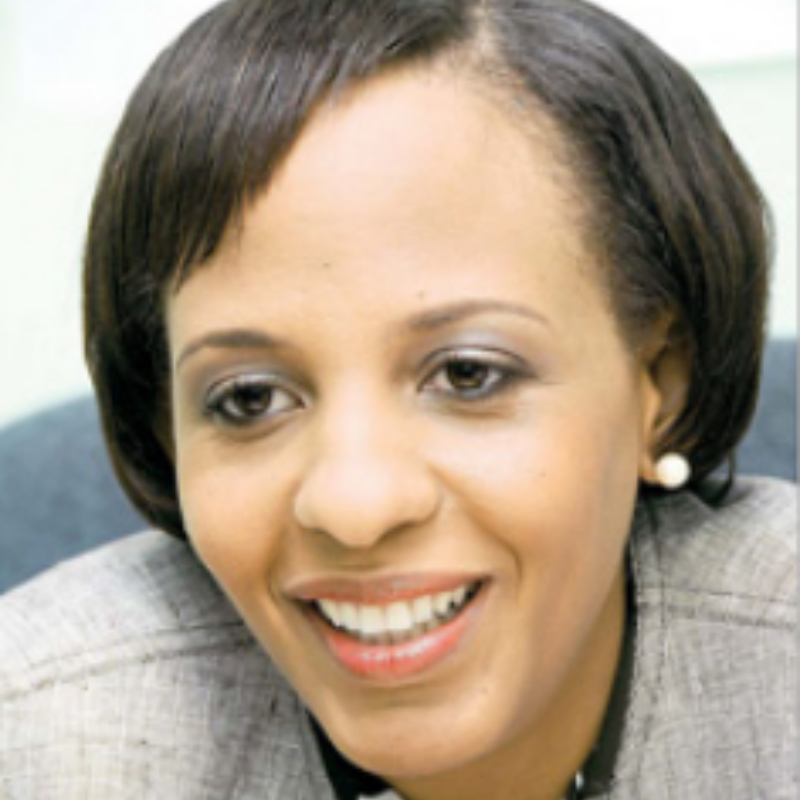
The Hon. Mrs. Justice Lisa Palmer Hamilton
Facilitator
Supreme Court of Jamaica – Jamaica
Bio
Justice Lisa Palmer Hamilton is a graduate of the University of the West Indies, Mona, where she completed, with honors, her degree in Law (1993). In 1995 Justice Palmer Hamilton completed her Certificate of Legal Education at the Norman Manley Law School and was subsequently called to the Bar in Jamaica.
Justice Palmer Hamilton worked as Clerk of Court in the Clarendon Resident Magistrate’s Court (now Parish Courts) before being invited to join the prosecutorial arm of the State, the Office of the Director of Public Prosecutions (ODPP), in 1996 as Assistant Crown Counsel.
While at the ODPP, Justice Palmer Hamilton prosecuted matters in the Circuit Courts, Full Court, and the Supreme Court and prepared and presented cases in the Court of Appeal.
Justice Palmer Hamilton served in the DPP’s Mutual Legal Assistance, Money Laundering, and Forfeiture of Proceeds Unit in 1997 and eventually acted as head of the Unit.
Workshop: What Needs to be Done? Pt 2
B4: Partnership
This session will incorporate the learnings on vulnerabilities and systemic gaps from previous sessions to brainstorm practical next steps in improving Partnerships in the region.

Christopher Reckford
Facilitator
Speaker – Author – Consultant – Facilitator
Bio
Christopher Reckord is a Technology Entrepreneur, Wine Enthusiast and life longer learner.
Chris is the co-author of a recently published book titled: Successful Digital Transformation – Your World, Your Business, Your Life … reimagined. Chris has been an executive in Cybersecurity & IT Provider firms for over 30 years. His is currently an Advisor and Consultant helping (1) organizations grow and scale by implementing a customized business blueprint & transformation system and (2) as a Virtual CEO / Virtual CTO offering advisory Services on business development, growth and scaling with digital transformation. For public service, Chris serves on a number of boards & committees for businesses and the Government of Jamaica including the recently formed National Artificial Intelligence Taskforce where he serves as Chairman and the Data Protection Oversight Committee (DPOC) where is currently serves as Chairman. For fun, his love for the business of wine ha seen him become the leading voice on the topic of wine in Jamaica, writing a weekly column for the Jamaica Observer for over 10+ years and conducting regular wine education & entertainment events.

Cherisse Francis, PhD
Facilitator
Attorney at law, Doctoral Candidate researching Trafficking in persons
Bio
Ms. Cherisse Francis is a native of the beautiful Caribbean island of Barbados. Although she now considers herself to be an educator and researcher Cherisse began her career as a legal professional having graduated from the University of the West Indies, Cave Hill Campus with a Bachelor of Laws (First Class Honours) and the University of Aberdeen with a Master of Laws (Distinction). Cherisse also attended the Hugh Wooding Law School where she completed her Legal Education Certificate on the Principal’s Honour Roll and was subsequently called to the Barbadian legal bar in 2018. Throughout her educational pursuits, Cherisse remained committed to the pursuit of human rights through academia and her volunteering activities. After her LLM, Cherisse spent a short time as an intern at the United Nations Office for Barbados and the OECS before accepting a position with the Human Trafficking Institute (HTI). From 2019 to 2020 Cherisse was employed by the HTI as Judicial Research Assistant to the designated Trafficking in Persons Judge in the Belizean High Court. In this role she was involved in legal writing and research as well as training activities for state and non-state actors both in Belize and across the Caribbean. These experiences led Cherisse to pursue her PhD studies examining the culture, history, discourses and law surrounding anti-trafficking in the Anglophone Caribbean at the University of Warwick, UK which she submitted in January 2024. Since becoming a part of the regional anti-trafficking field Cherisse has also been involved in numerous consultancies, trainings, and workshops as a facilitator and scholar. At present, Cherisse is a Senior Lecturer (Law) at St.Mary’s University, Twickenham in England where she has taught among other things a course on Organised Crime, Trafficking and Contemporary slavery. She also continues to be engaged in research and serves as a trustee for the Commonwealth Human Rights Initiative (London Office) which has modern slavery as a flagship area.
FACILITATED DISCUSSION
Developing Action Plans for Prevention, Prosecution, Protection & Partnership
Facilitators will lead participants through the process of refining the ideas generated in Workshops A3, B3, A4, and B4 into a regional action plan that addresses vulnerabilities and gaps in the Caribbean anti-trafficking approaches.

Lissette Reyes
Facilitator
Lissette Reyes,
Project Officer for the TRACK4TIP Initiative
Bio
Ms. Lissette Reyes works as the Project Officer for the TRACK4TIP Initiative in the Caribbean: “Transforming Alerts into Criminal Justice Responses to Combat Trafficking in Persons within migration flows” at the United Nations Office on Drugs and Crime. For the last four years, Ms. Reyes has worked to support and lead the coordination and implementation of the project, among other TIP initiatives in the Caribbean, while closely collaborating with the Human Trafficking and Migrant Smuggling Section at UNODC headquarters.
With a background in project management for community and international development, Lissette has gained valuable experience in overseeing various projects. She holds a postgraduate diploma in development and a master’s degree in political science with a specialization in international development and international cooperation.
Ms. Reyes served for five years at the U.S. Department of State in the Dominican Republic. Ms. Reyes worked in consular affairs and investigations dealing with multiple areas such as document counterfeiting, smuggling of migrants, safe migration, and trafficking in persons, among others. During this time, she actively participated in outreach campaigns against irregular pathways for migration, facilitated capacity building, led investigative cases, and engaged in public policy analysis.
Ms. Reyes has worked on the review of policies, national action plans, and legislation. Ms. Reyes has worked as an independent consultant, providing expertise in communication, project operations, and implementation. Lissette has extensive experience providing training and leading capacity-building activities for government officials, and law enforcement, as well as working to enhance the criminal justice responses to human trafficking through the design of tools and technical assistance in the region.
Ms. Reyes’s expertise has been regarded for her ability to convene with multiple stakeholders in the search of new approaches to combat trafficking.
FACILITATED DISCUSSION
What’s Next for the Caribbean Region?
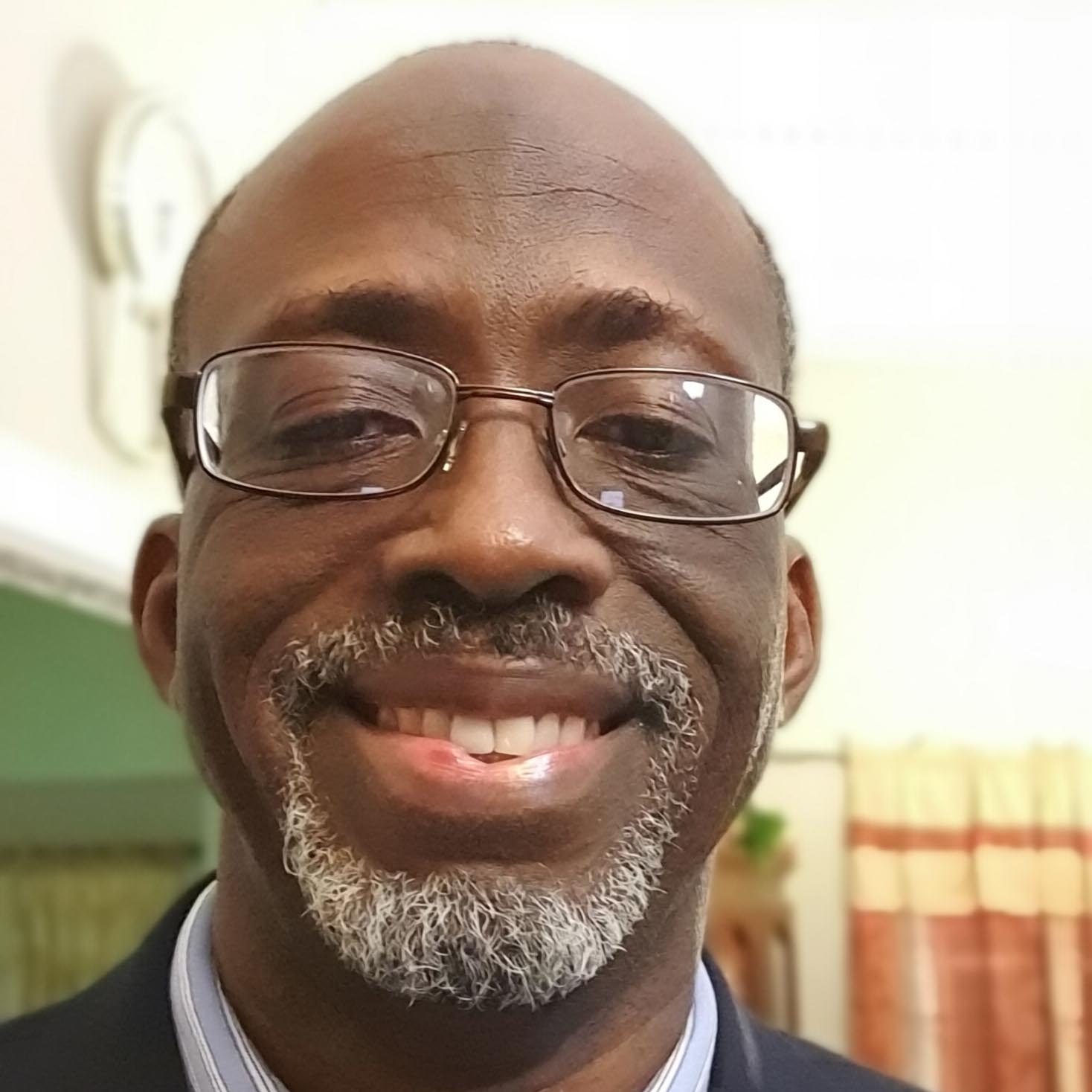
Adrian Alexander
Moderator
Advocacy and Movement Building Country Manager
Bio
Adrian Alexander is the Advocacy and Movement Building Country Manager for Free The Slaves based in Trinidad and Tobago. He has been privileged to serve as a volunteer with civil society organizations for the past 20 years. For 14 of those years, he has been involved in the fight against human trafficking. Through this work, Adrian is committed to helping shape a more compassionate, trauma-informed Caribbean.

Charmaine Gandhi Andrews
Facilitator
Consultant
Azanique Development
Bio
Charmaine Gandhi-Andrews served in the Trinidad and Tobago Public Service for thirty-eight years, thirty-two of which was spent as an Immigration Officer in the Ministry of National Security. She became the first female Chief Immigration Officer in Trinidad and Tobago in 2015, a position she held until her early retirement from Public Service in January of this year.
Passionate about issues relating to trafficking in persons, Charmaine has been involved in anti-human trafficking activities since 2009. She advocated for and was actively involved in developing and implementing policies and legislation on trafficking in persons in Trinidad and Tobago. In 2012 she was appointed as the first Director to lead the establishment of Trinidad and Tobago’s Counter Trafficking Unit and develop and implement the country’s anti-trafficking efforts. She led the investigation, identification, rescue, rehabilitation, and reunification of victims of human trafficking with their families.
The US State Department recognized Charmaine as a hero acting to end modern-day slavery in its 2014 Trafficking in Persons Report. In December 2022, she was honored with the Migrant Hero Award from the International Organization for Migration, Port of Spain office, for her years of dedication and service in the field of migration.

Diahann Gordon Harrison
Panelist
National Rapporteur on Trafficking in Persons, Jamaica
Bio
Mrs. Diahann Gordon Harrison has been the Children’s Advocate of Jamaica since January 2012 and has been Jamaica’s National Rapporteur on Trafficking in Persons since March 2015, making her the first to hold such a post in the Latin American & Caribbean Region. She is an Attorney-at-Law by profession, with over 20 years of experience, and has practiced at the Public Bar since she graduated from The Norman Manley Law School. Before she was appointed Children’s Advocate, Mrs. Gordon Harrison served as a Deputy Director of Public Prosecutions within the Office of the Director of Public Prosecutions.
Known for her advocacy skills, she states that her current roles provide a national and regional platform from which to promote the rights of children and other people in vulnerable circumstances from a victim-centered and rights-based orientation. She is also passionate about accountability frameworks through which persons who violate the rights of children and vulnerable persons can be held responsible for their actions.
Mrs. Gordon Harrison is an Associate Tutor at the Norman Manley Law School, has also been an external reviewer for the British Council in Jamaica, and has been designated champion for CARICOM’s Regional Sex Guidelines for Courts. In November 2019, she was certified as a global expert by the Geneva-based Justice Rapid Response Roster of global experts in International Criminal Law for potential deployment worldwide with a focus on Crimes against Humanity, War Crimes, and International Human Rights Law. Since 2020 she has been a serving member of the Board of Directors for the International Society for the Prevention of Child Abuse and Neglect, a United States-based non-profit organization that works in over 200 countries worldwide.

Dalaina May
Panelist
Founder/Executive Director
Dark Bali
Bio
Dalaina grew up overseas and has lived in 5 countries on 3 continents. When she moved to Indonesia, she finally found her home. She holds a BA in Intercultural Studies from Biola University and a MA in Global Leadership with an emphasis in Children at Risk from Fuller Seminary. After supporting the local staff of a newly opened safehouse for trafficked teen girls in Bali, Indonesia, she realized that there was a need for an organization providing similar support for the entire Indonesian anti-trafficking community, and Dark Bali was born.

Fernando Garcia-Robles
Panelist
Anti-Trafficking in Persons and Human Rights Specialist
Bio
Fernando García-Robles, is a specialist on human rights and against trafficking in persons for the Inter-American Commission on Human Rights, Rapporteurship of Human Mobility. It is responsible for the strategic monitoring of trafficking in persons in the Americas, from crime prevention, criminalization of traffickers, as well as assistance and protection of victims, to the strengthening of international cooperation. Additionally, he is the specialist for the country rapporteurship of Canada. Fernando Coordinated the Section against Trafficking in Persons at the Organization of American States for more than 15 years and since 2020 he has been dedicated in the strengthening of the Commission’s fight against this crime. Fernando is a former career diplomat, having held positions at the multilateral level in matters of security, democracy, and gender equality. He has experience in the private sectors and civil society. Fernando holds masters’ degrees from the universities of Johns Hopkins and Notre Dame. Likewise, he was a fellow on peace studies and conflict resolution, from the Peace University in Stadschlaing, Austria and Uppsala University, Sweden; respectively. Fernandohas been an active board-member on various non-for-profit organizations volunteering on project against human trafficking.
2024 Caribbean Forum Planning Committee

Dr Jason Haynes
Associate Professor of Law and Deputy Head of Postgraduate Studies
University of the Birmingham, UK
Dr Jason Haynes's Bio
Dr Jason Haynes is an attorney-at-law of over 7 years, having been called to the Bar of St Vincent and the Grenadines and Barbados. At present, he is an Associate Professor of Law and Deputy Head of Postgraduate Studies at the University of Birmingham, UK. Previously, he was a Senior Lecturer in Law and Deputy Dean (Graduate Studies and Research) at the University of the West Indies, Cave Hill Campus, Barbados. He served as a Senior Legal Officer at the British High Commission in Barbados for the UK Foreign and Commonwealth Office and the Crown Prosecution Service. In this capacity, he worked on a range of matters, including human trafficking.
He has consulted on the issue of human trafficking for the British Institute of International and Comparative Law, the American Bar Association Rule of Law Initiative, and the Caribbean Community. On the issue of migrant smuggling, he has consulted for the International Organisation for Migration (Caribbean). He has advised a range of regional and international actors on human trafficking, including the Commonwealth Parliamentary Association, Free the Slaves, CARICOM IMPACTS, and the United Nations Office on Drugs and Crime, and has drafted sentencing guidelines on human trafficking for the Eastern Caribbean Supreme Court. He has written a book (Hart Publishing) on human trafficking, as well as several journal articles in international peer-reviewed journals.
He has a First Class Honours LLB degree (University of the West Indies), a LLM with Distinction (University of Nottingham), a MSc (University of Oxford), and a PhD (Durham University). He is a Chevening Scholar and a Commonwealth Scholar, an O’Brien Fellow in Residence at McGill University, an Academic Fellow of the Honourable Society of Middle Temple, UK, and the Fellow of the UK Higher Education Academy. His work on human trafficking won the 2022 UNESCO/Juan Bosch Prize for Outstanding Contribution to Social Science Research in Latin America and the Caribbean.

MERPHILUS JAMES
President
Disabled People’s International North America & The Caribbean Inc.
Merphilus James's Bio
Merphilus James is an avid disability rights advocate from the island of Saint Lucia. He has served as President of the National Council for Persons with Disabilities (NCPD) in Saint Lucia since January 2015. In 2019 he was elected President of Disabled People’s International North America and The Caribbean Inc. (DPI NAC) at the Tenth Regional Assembly which was held in Saint Kitts.
Due to an extremely rare condition called Amniotic Band Syndrome, Merphilus was born with differences of his right hand and left leg. He has used a left prosthetic leg from the age of four. James is passionate about the advancement of persons with disabilities through education, social justice and empowerment, harnessing the innate talents of PWDs in advocacy and public awareness.
Merphilus James has held positions in the public service as a Programme Officer and National Volunteer Coordinator in the Office of the Prime Minister of Saint Lucia. He is currently a Training Officer with the National Skills Development Center where he cherishes his involvement in the education of youth in invaluable, marketable technical vocational skills.
Major projects currently being undertaken under James’ leadership in Saint Lucia are prosthetic leg manufacturing, mobility aid distribution, climate resilience aquaponics for persons with disabilities and community-based rehabilitation.

Sandra Christie Brown
Founder
Finding Your Light Foundation, Inc.
Sandra Christie Brown's Bio
Sandra Christie Brown is the founder of the Finding Your Light Foundation, Inc. focusing on mental health. She is a member of Metropolitan Dade County Section-NCNW, Inc. (MDCS-NCNW) and served two terms as President. Sandra led the Section to new heights in membership, scholarships, partnerships, and community empowerment. The Section adopted the Bethune Head Start School; partnered with the City of Miami’s Health/Resource Fair; Bethune Cookman University’s Miami Dade Alumni Chapter and National Organization of Black Law Enforcement’s (NOBLE) Annual Holiday Toys Giveaway; and Tallahassee Florida group against Human Trafficking Education Bill. MDCS awarded $1,000 scholarships to seniors attending HBCUs; held Voter Education Workshops kicking-off “Four for The Future.” Sandra introduced the Dr. Mary McLeod Bethune Vegetable Garden “Plant, Grow, and Eat,” and facilitated the Dr. Dorothy I. Height Forever Black Heritage Stamp Dedication. Sandra has served as NCNW National Executive Board Member-at- Large from 2014-present and was appointed September 2020 by Dr. Johnnetta Cole as NCNW National Chair Human Trafficking Committee
Memberships: NAACP.; National Organization Black Law Enforcement Executives, Toastmasters International; Women’s Chamber of Commerce; Bethune Cookman University Miami-Dade Alumni Chapter-Honorary Member; The People Profile former Executive Director, National Organization of Black Law Enforcement Executives; and Board Member-Foundation of Community Assistance & Leadership.
Honors: Maverley Primary School Wellness Center in honor of Sandra Christie Brown 2023, The People Profile Corporate Leader of the Year 2020.MDCS-NCNW Dr. Dorothy I. Height Leadership Award 2016, Dr. Mary McLeod Bethune Distinguished Award 2018; and 2016 NOBLE South Florida Chapter Sector Member of the Year.
Sandra attended Miami Dade College and majored in Business Administration. A 31-year career Insurance and finance, she is an Insurance Broker with Access Life and holds a FL 2-15 License in FL, GA, MD, SC, NC, OH, MI, TX, Life, Health, and Variable Annuities.

Ms. Cherisse Francis
Attorney at law
Doctoral Candidate researching Trafficking in persons
Cherisse Francis's Bio
Ms. Cherisse Francis is a native of the beautiful Caribbean island of Barbados. Although she now considers herself to be an educator and researcher Cherisse began her career as a legal professional having graduated from the University of the West Indies, Cave Hill Campus with a Bachelor of Laws (First Class Honours) and the University of Aberdeen with a Master of Laws (Distinction). Cherisse also attended the Hugh Wooding Law School where she completed her Legal Education Certificate on the Principal’s Honour Roll and was subsequently called to the Barbadian legal bar in 2018. Throughout her educational pursuits, Cherisse remained committed to the pursuit of human rights through academia and her volunteering activities. After her LLM, Cherisse spent a short time as an intern at the United Nations Office for Barbados and the OECS before accepting a position with the Human Trafficking Institute (HTI). From 2019 to 2020 Cherisse was employed by the HTI as Judicial Research Assistant to the designated Trafficking in Persons Judge in the Belizean High Court. In this role she was involved in legal writing and research as well as training activities for state and non-state actors both in Belize and across the Caribbean. These experiences led Cherisse to pursue her PhD studies examining the culture, history, discourses and law surrounding anti-trafficking in the Anglophone Caribbean at the University of Warwick, UK which she submitted in January 2024. Since becoming a part of the regional anti-trafficking field Cherisse has also been involved in numerous consultancies, trainings, and workshops as a facilitator and scholar. At present, Cherisse is a Senior Lecturer (Law) at St.Mary’s University, Twickenham in England where she has taught among other things a course on Organised Crime, Trafficking and Contemporary slavery. She also continues to be engaged in research and serves as a trustee for the Commonwealth Human Rights Initiative (London Office) which has modern slavery as a flagship area.

Charmaine Gandhi-Andrews
Consultant
Charmaine Gandhi-Andrews's Bio
Charmaine Gandhi-Andrews served in Trinidad and Tobago Public Service for thirty-eight years, thirty-two of which was spent as an Immigration Officer in the Ministry of National Security. She became the first female Chief Immigration Officer in Trinidad and Tobago in 2015, a position she held until her early retirement from Public Service in January of this year.
Passionate about issues relating to trafficking in persons, Charmaine has been involved in anti-human trafficking activities since 2009. She advocated for and was actively involved in developing and implementing policies and legislation on trafficking in persons in Trinidad and Tobago. In 2012 she was appointed as the first Director to lead the establishment of Trinidad and Tobago’s Counter Trafficking Unit and develop and implement the country’s anti-trafficking efforts. She led the investigation, identification, rescue, rehabilitation, and reunification of victims of human trafficking with their families.
The US State Department recognized Charmaine as a hero acting to end modern-day slavery in its 2014 Trafficking in Persons Report. In December 2022, she was honored with the Migrant Hero Award from the International Organization for Migration, Port of Spain office, for her years of dedication and service in the field of migration.

Coleen Morris
Anti-Human Trafficking Officer
Office of the National Rapporteur on Trafficking in Persons (ONRTIP)
Coleen Morris's Bio
Ms. Coleen Morris is the Anti-Human Trafficking Officer for the Office of the National Rapporteur on Trafficking in Persons (ONRTIP). She supports the National Rapporteur on Trafficking in Persons and the Senior Anti-Human Trafficking Officer in research, policymaking, monitoring, evaluation, and reporting of strategies geared towards enabling the mitigation and reduction of Human Trafficking in Jamaica. Ms. Morris plays a key role in the development of initiatives geared towards enabling survivors and vulnerable groups to understand the normative and regulatory framework surrounding the issue of human trafficking and monitors and reports on the nature and scope of human trafficking in Jamaica, including for the U.S. Department of State’s Trafficking in Persons Report. She holds a Bachelor of Science (BSc.) in Psychology and a Master of Science (MSc.) in Applied Psychology. She has years of experience playing various roles in the design, implementation, analysis, and reporting of data for various stakeholders.

Diahann Gordon Harrison
National Rapporteur on Trafficking in Persons
Jamaica
Diahann Gordon Harrison's Bio
Mrs. Diahann Gordon Harrison has been the Children’s Advocate of Jamaica since January 2012 and has been Jamaica’s National Rapporteur on Trafficking in Persons since March 2015, making her the first to hold such a post in the Latin American & Caribbean Region. She is an Attorney-at-Law by profession, with over 20 years of experience, and has practiced at the Public Bar since she graduated from The Norman Manley Law School. Before she was appointed Children’s Advocate, Mrs. Gordon Harrison served as a Deputy Director of Public Prosecutions within the Office of the Director of Public Prosecutions.
Known for her advocacy skills, she states that her current roles provide a national and regional platform from which to promote the rights of children and other people in vulnerable circumstances from a victim-centered and rights-based orientation. She is also passionate about accountability frameworks through which persons who violate the rights of children and vulnerable persons can be held responsible for their actions.
Mrs. Gordon Harrison is an Associate Tutor at the Norman Manley Law School, has also been an external reviewer for the British Council in Jamaica, and has been designated champion for CARICOM’s Regional Sex Guidelines for Courts. In November 2019, she was certified as a global expert by the Geneva-based Justice Rapid Response Roster of global experts in International Criminal Law for potential deployment worldwide with a focus on Crimes against Humanity, War Crimes, and International Human Rights Law. Since 2020 she has been a serving member of the Board of Directors for the International Society for the Prevention of Child Abuse and Neglect, a United States-based non-profit organization that works in over 200 countries worldwide.

Neil Bacchus
Chief Executive Officer
Indigenous Peoples’ Commission
Neil Bacchus's Bio
Neil Bacchus is the Chief Executive Officer of the Indigenous Peoples’ Commission which promotes and protects the rights of Indigenous Peoples in Guyana. He has double master’s qualifications, professional qualifications in project management, and a degree and diploma in Public Management. Neil serves on several NGOs, including the National Task Force on Trafficking in Person and the Inter-religious Organisation in Guyana. He is a community, religious, and youth advocate. He has over twenty-eight years of working experience and possesses excellent logistical, training, and operational skills. Neil has recently completed a Fellowship Program in Religious Dialogue and culture and is committed to moving Guyana and the Caribbean forward.

Rene M. Baptiste
Managing partner
Baptiste & Co.
Rene M. Baptiste's Bio
René Mercedes Baptiste CMG is a distinguished legal and political figure, renowned for her groundbreaking contributions in St. Vincent and the Grenadines. With a career spanning over four decades, she has earned accolades as a Barrister, Solicitor, Notary Public, and Certified Mediator. René made history as the first female lawyer elected to the Parliament of St. Vincent and the Grenadines in 2001, a testament to her trailblazing spirit and dedication to advancing gender equality in the legal and political arenas.
René’s illustrious legal career began when she was called to the Bar of St. Vincent and the Grenadines in 1976. She played a pivotal role in shaping the Offshore Finance Sector, establishing and managing its regulatory framework from 1976 to 1986. In 1986, she founded Baptiste & Co. Law Firm, where her expertise in Corporate, Commercial, Family, Probate, and Property Law has garnered widespread recognition.
René served two terms in Parliament from 2001 to 2010, holding senior cabinet positions in Tourism, Culture, Urban Development, Labour, and Electoral Matters. Currently, she serves as the esteemed Speaker of the OECS Parliamentary Assembly, embodying her commitment to regional cooperation and governance.
René has served as President of the SVG Bar Association and held leadership roles in various community organizations, including the SVG Girls Guide Association, Ste. George’s Cathedral Parish, SVG Red Cross Society, and the General Employees Co-operative Credit Union. A passionate advocate for women’s empowerment and youth development, René serves as a patron of the SVG Netball Association and Brownie Sports.
René Mercedes Baptiste CMG remains actively engaged in professional affiliations, including membership in the UWI Advisory Council Global Campus – SVG, OCCBA, OECS Bar Association, and Commonwealth Lawyers Association. As the Co-Chair of the ADR Committee ECLA, she continues to champion alternative dispute resolution mechanisms for the betterment of society.
Event Resources

Resources





